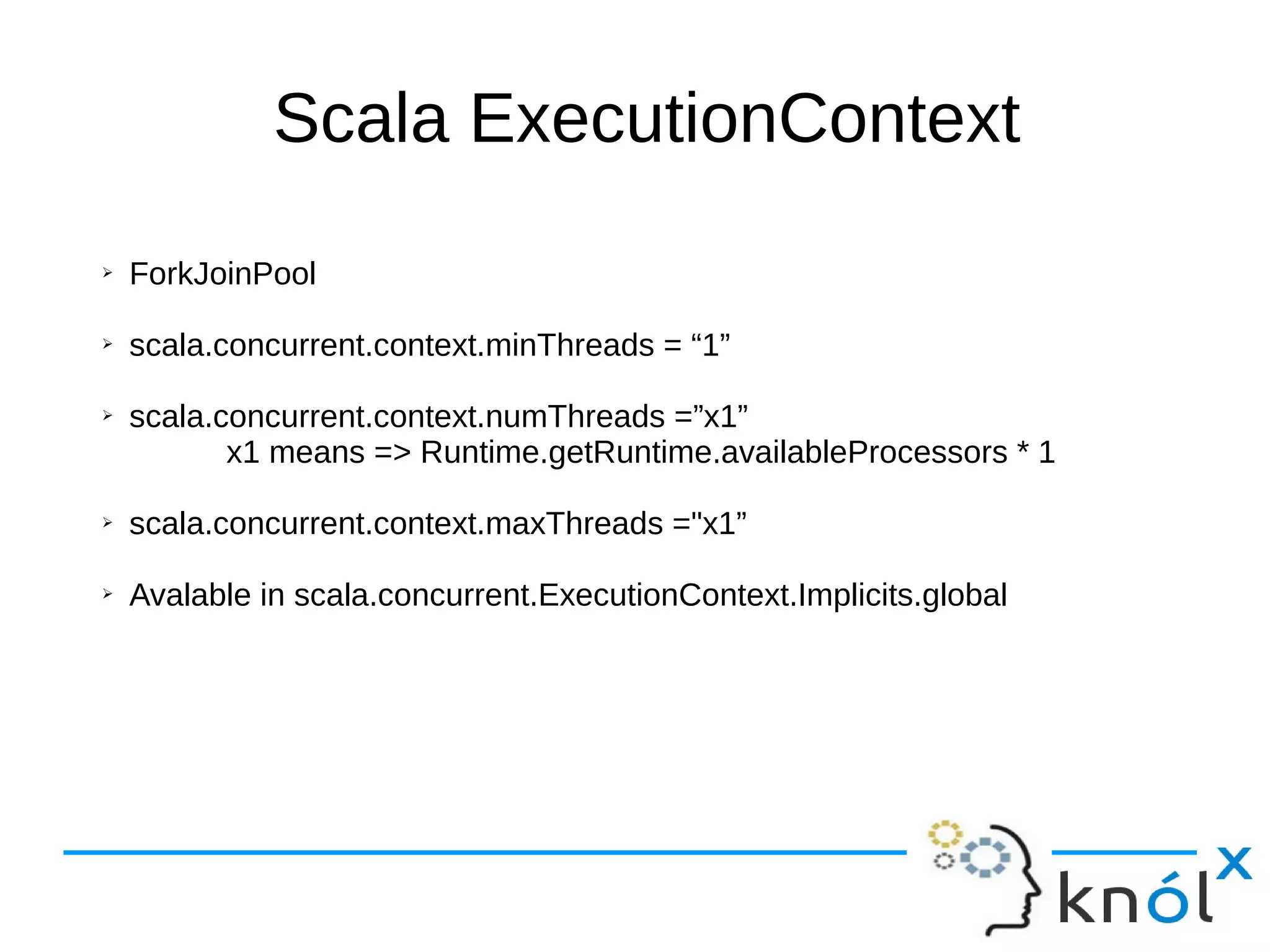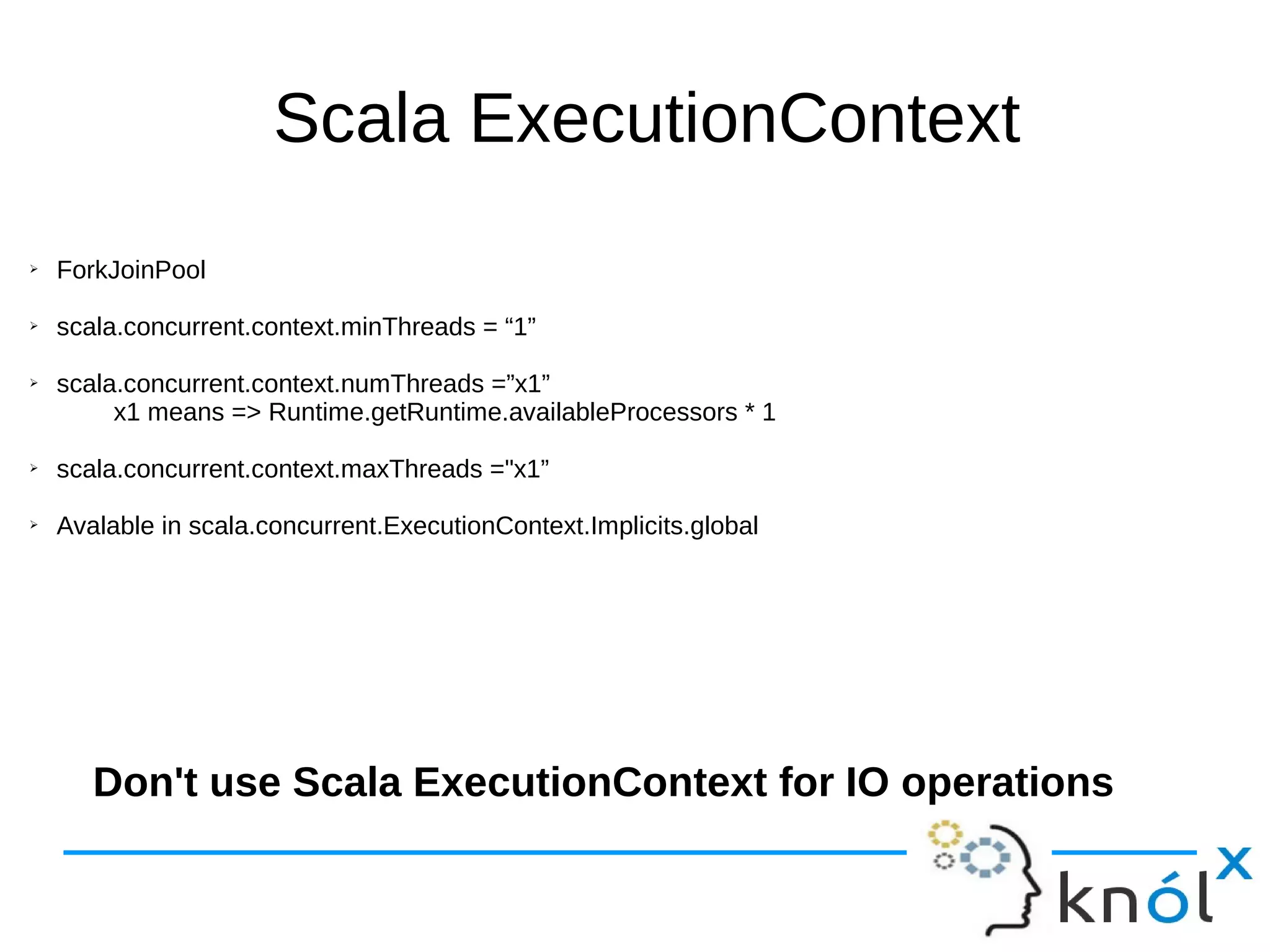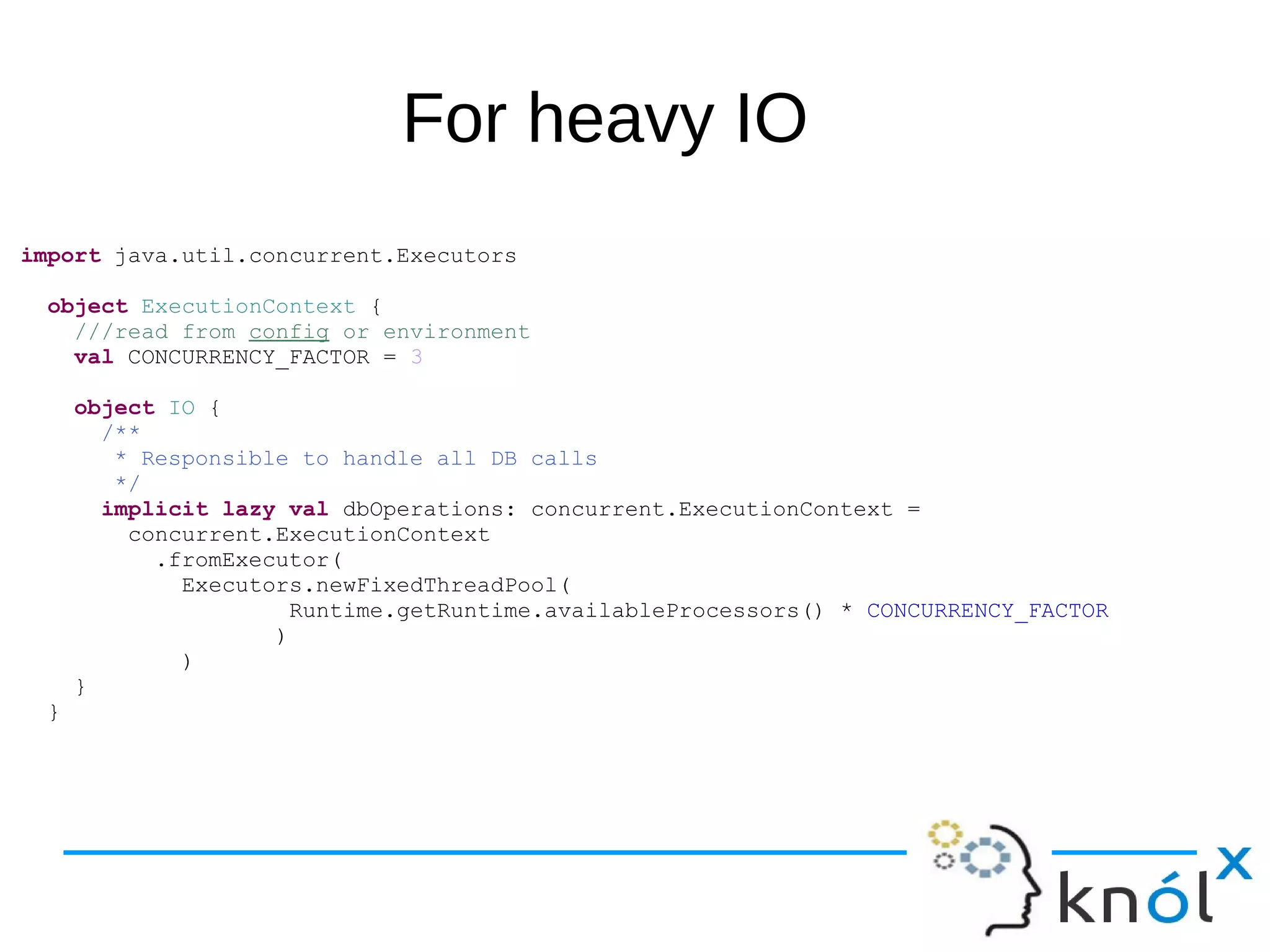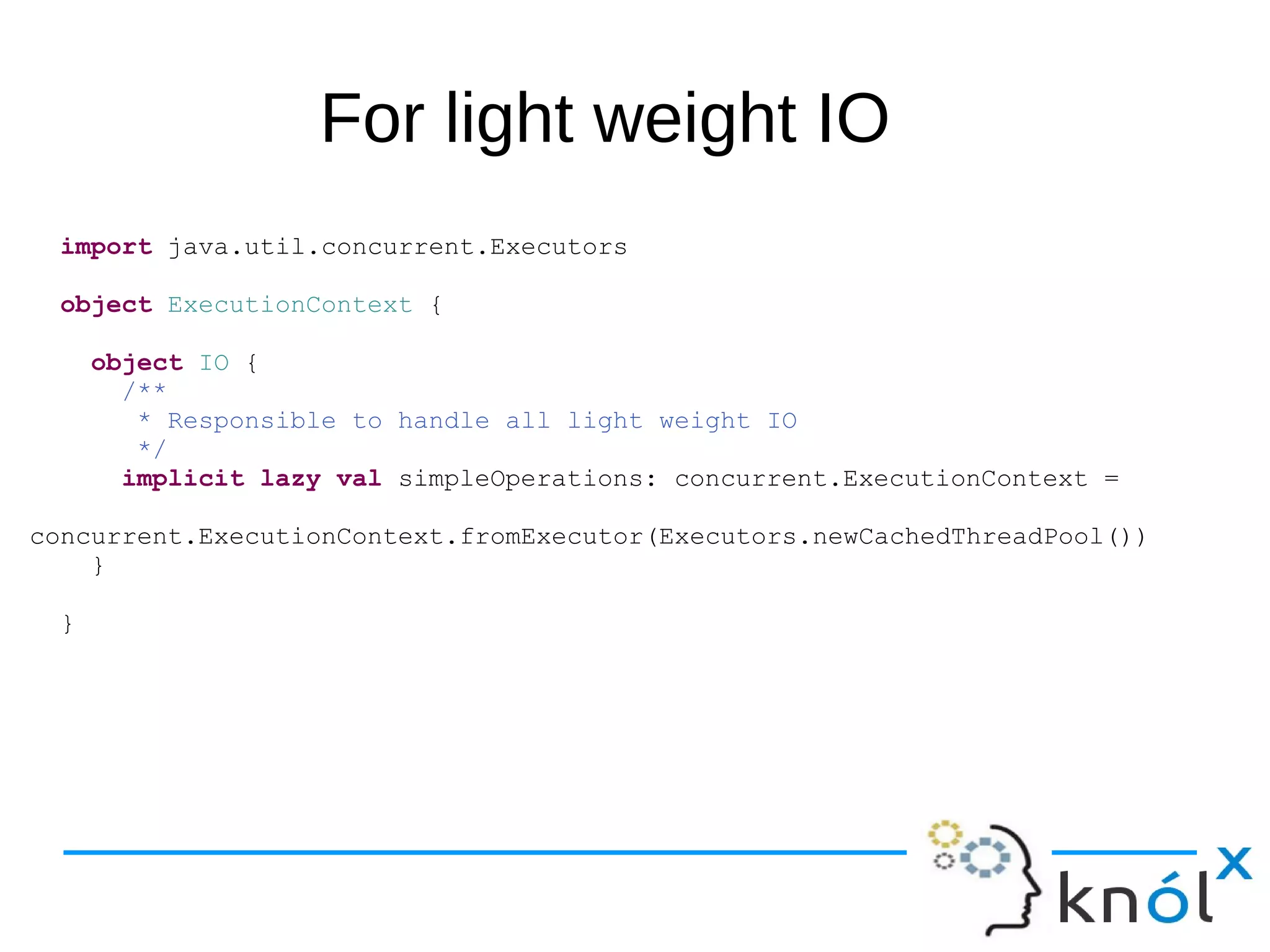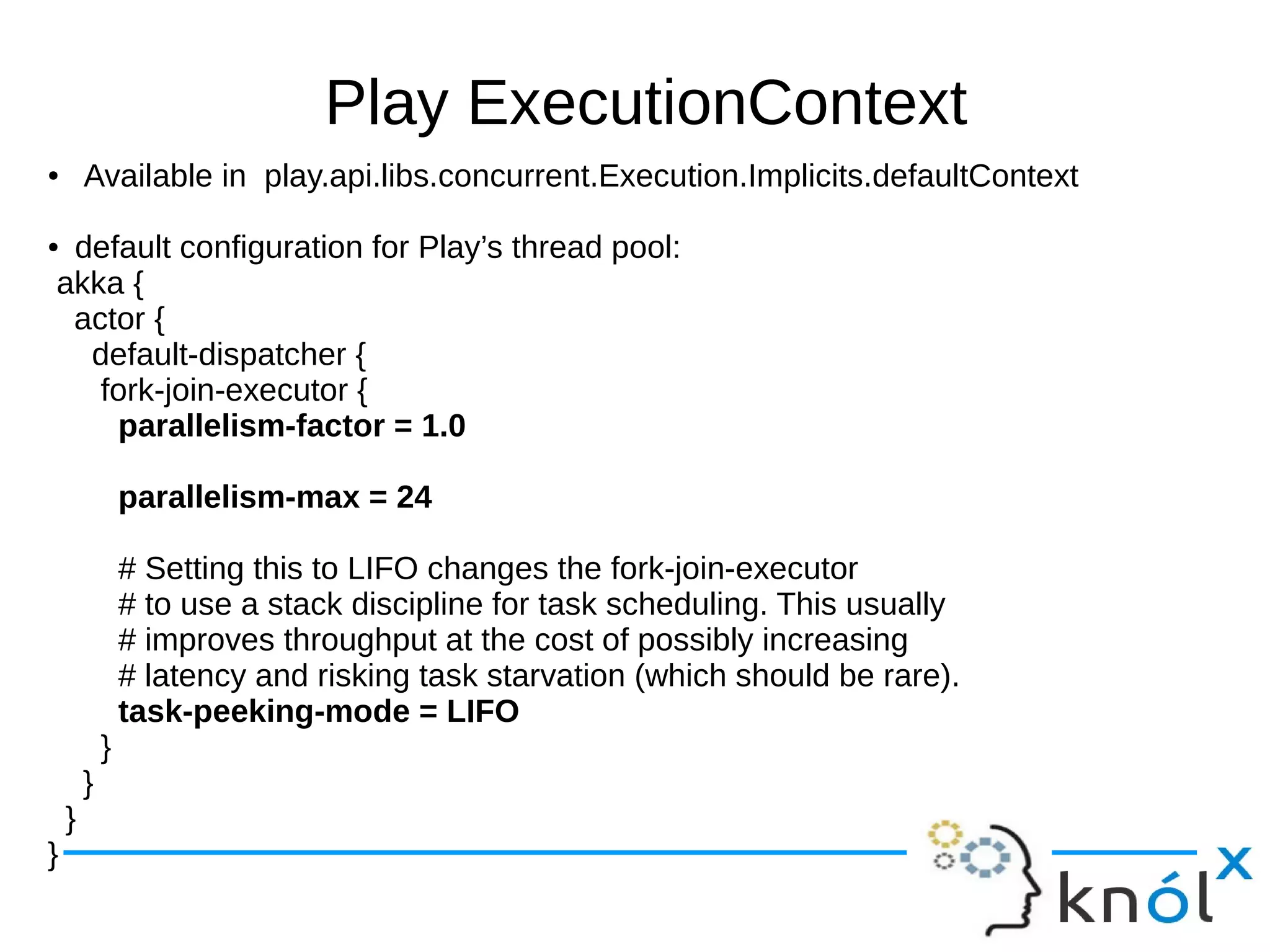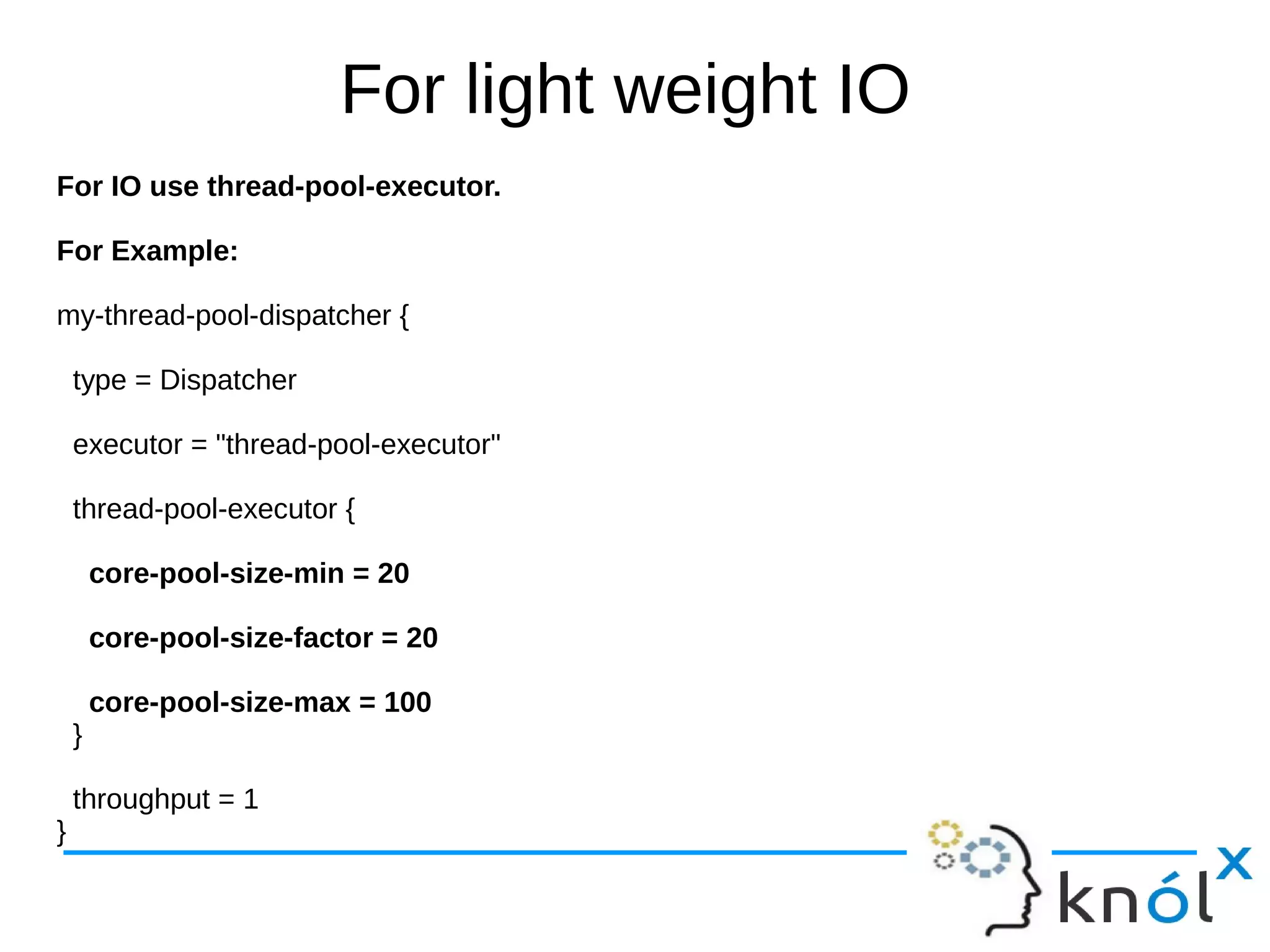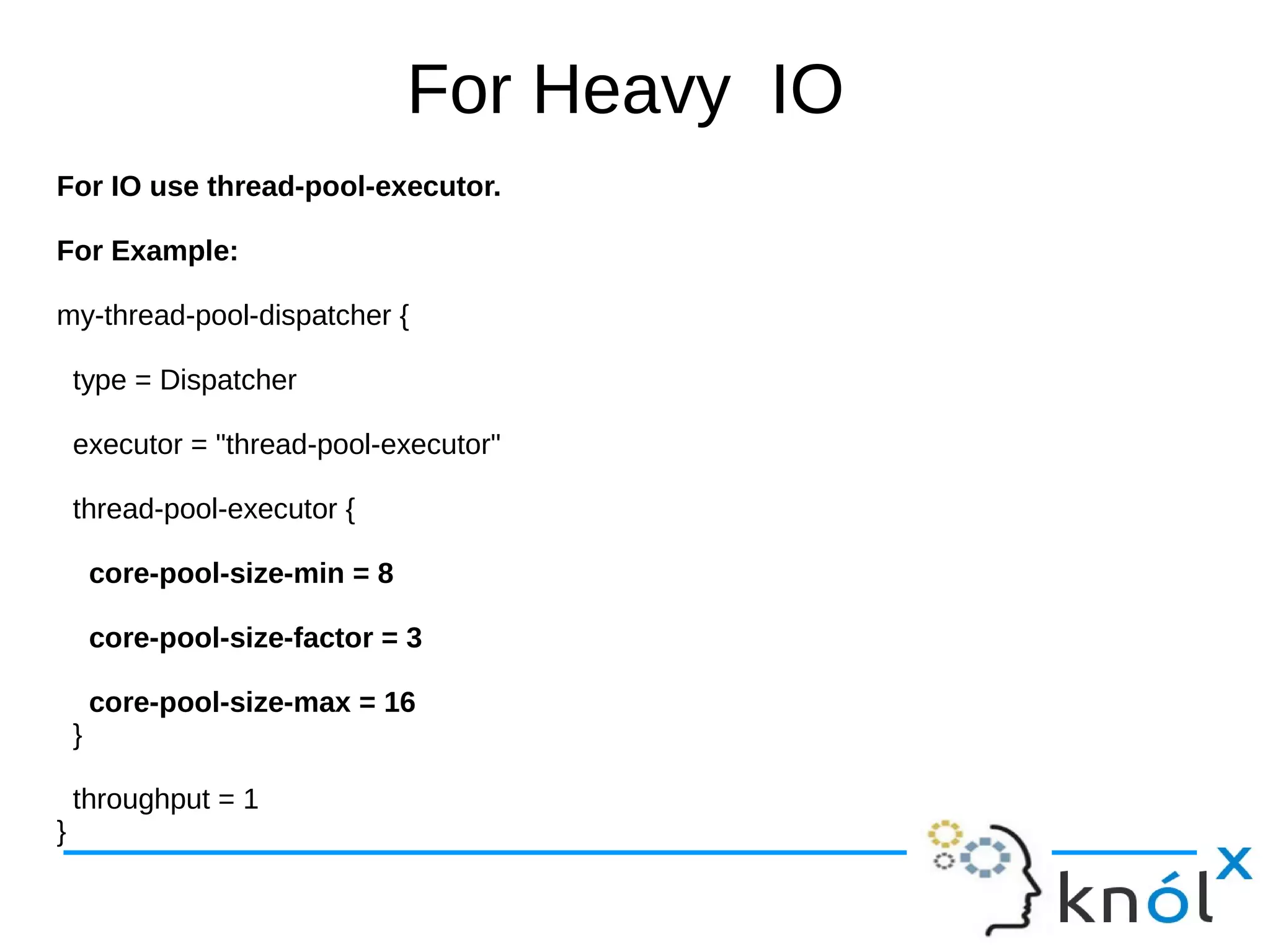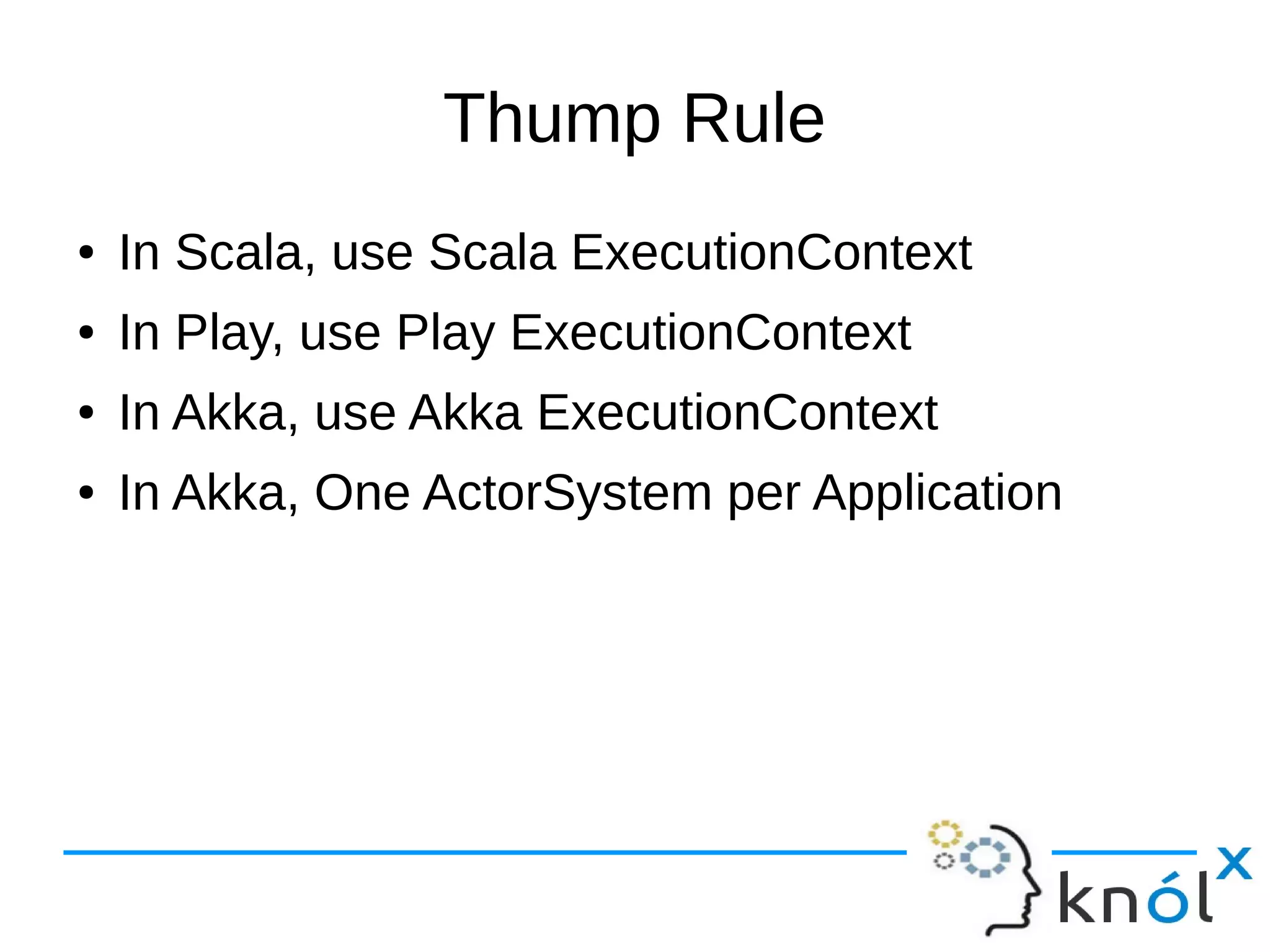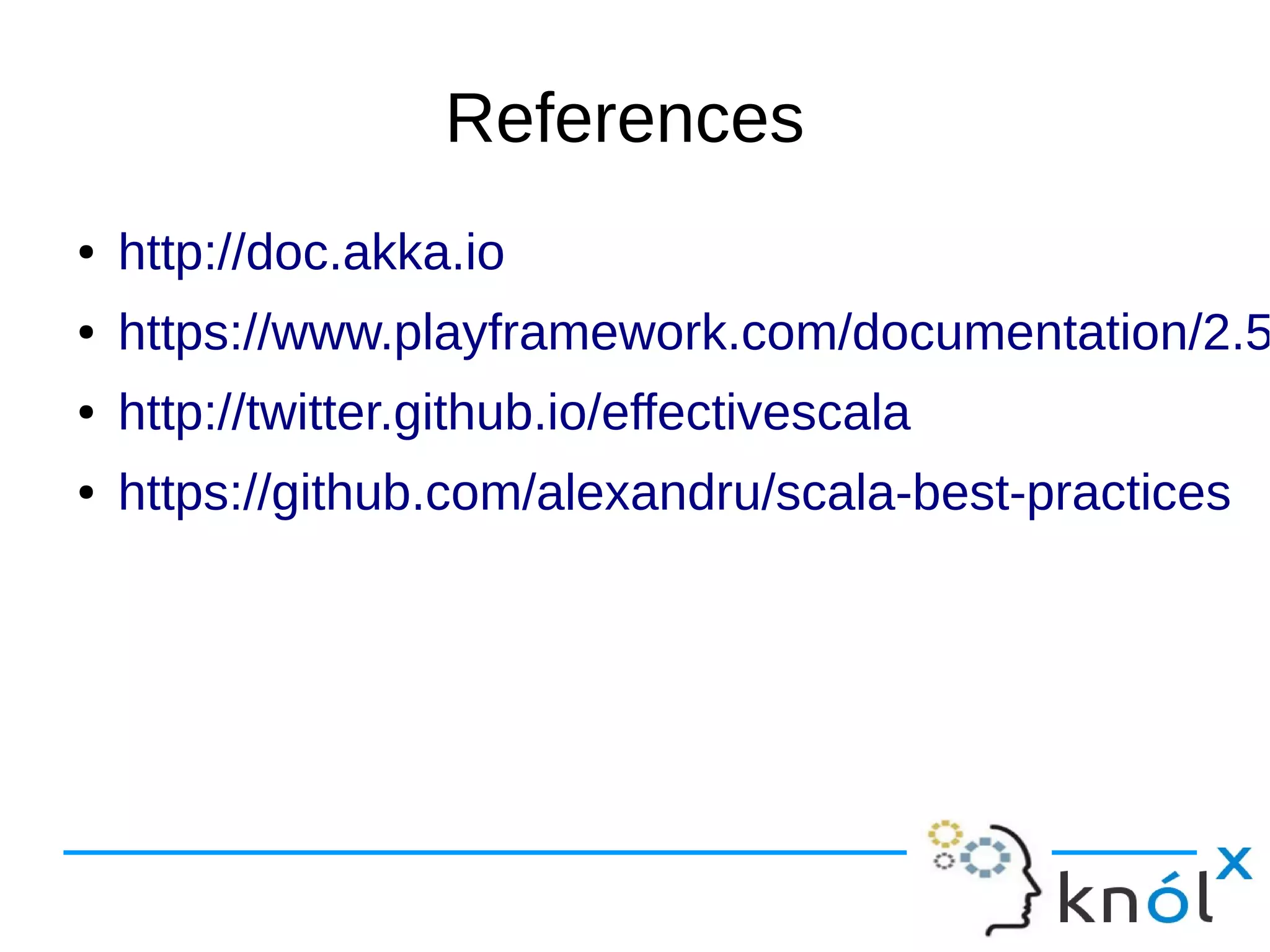The document outlines effective coding practices in Scala, covering topics such as pattern matching, variable declaration with 'val' vs 'var', error handling with try/catch, recursion vs iteration, and the usage of tuples. It emphasizes avoiding certain pitfalls, such as using mutable collections with mutable variables, and encourages using 'fold' instead of 'getOrElse' for safer operations on options. Additionally, it discusses future composition and strategies for ensuring type safety and performance in Scala.
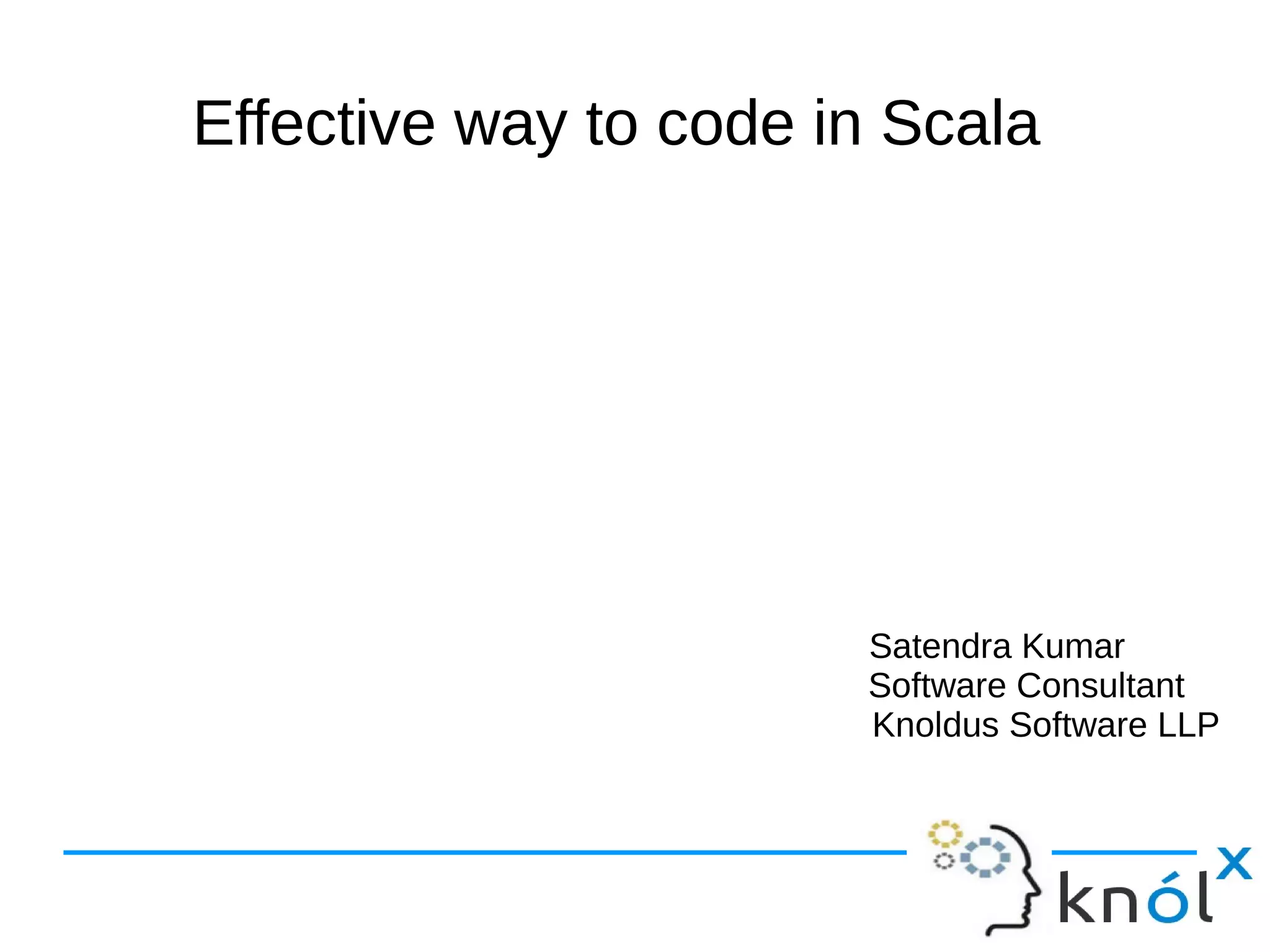

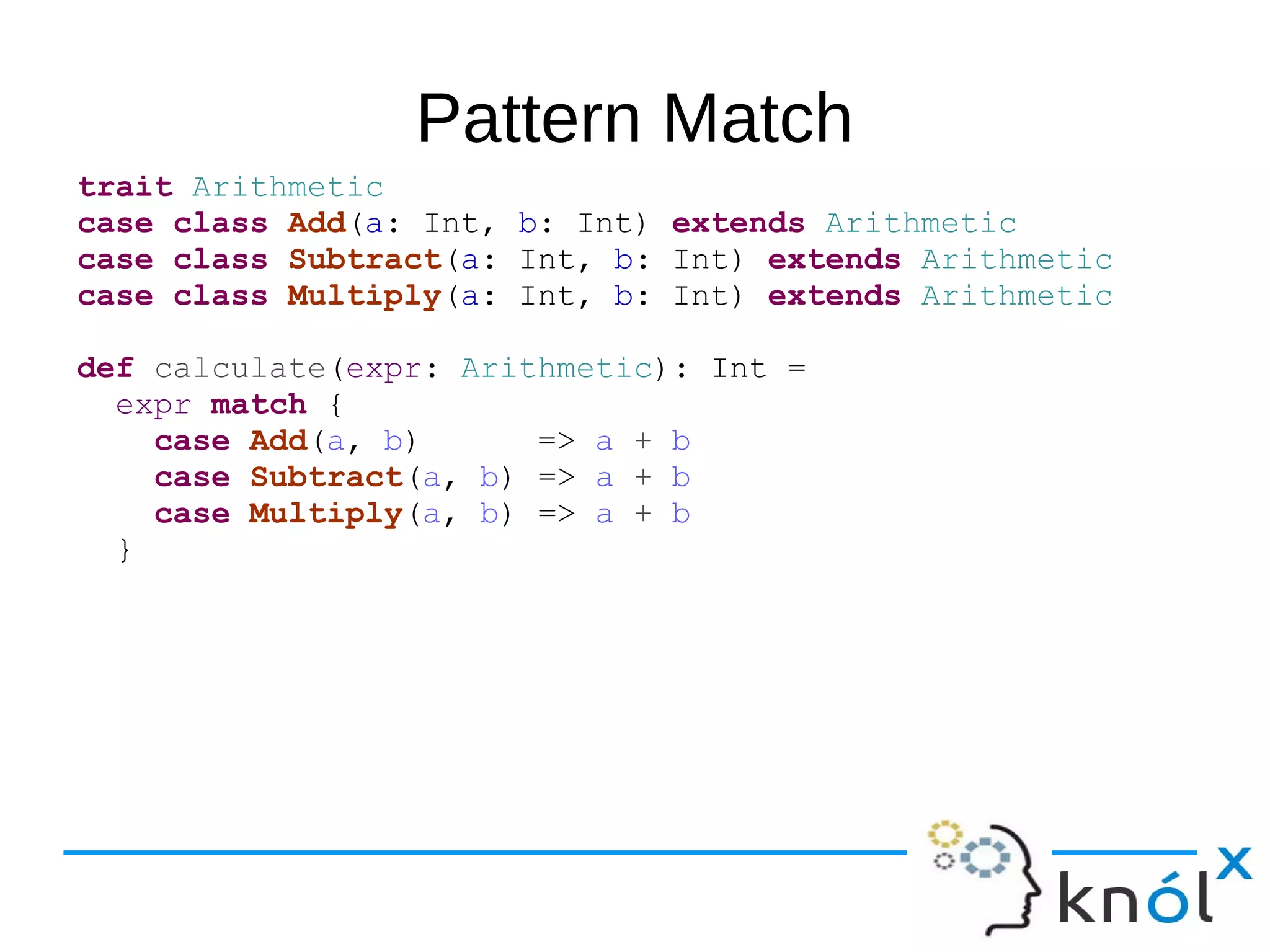
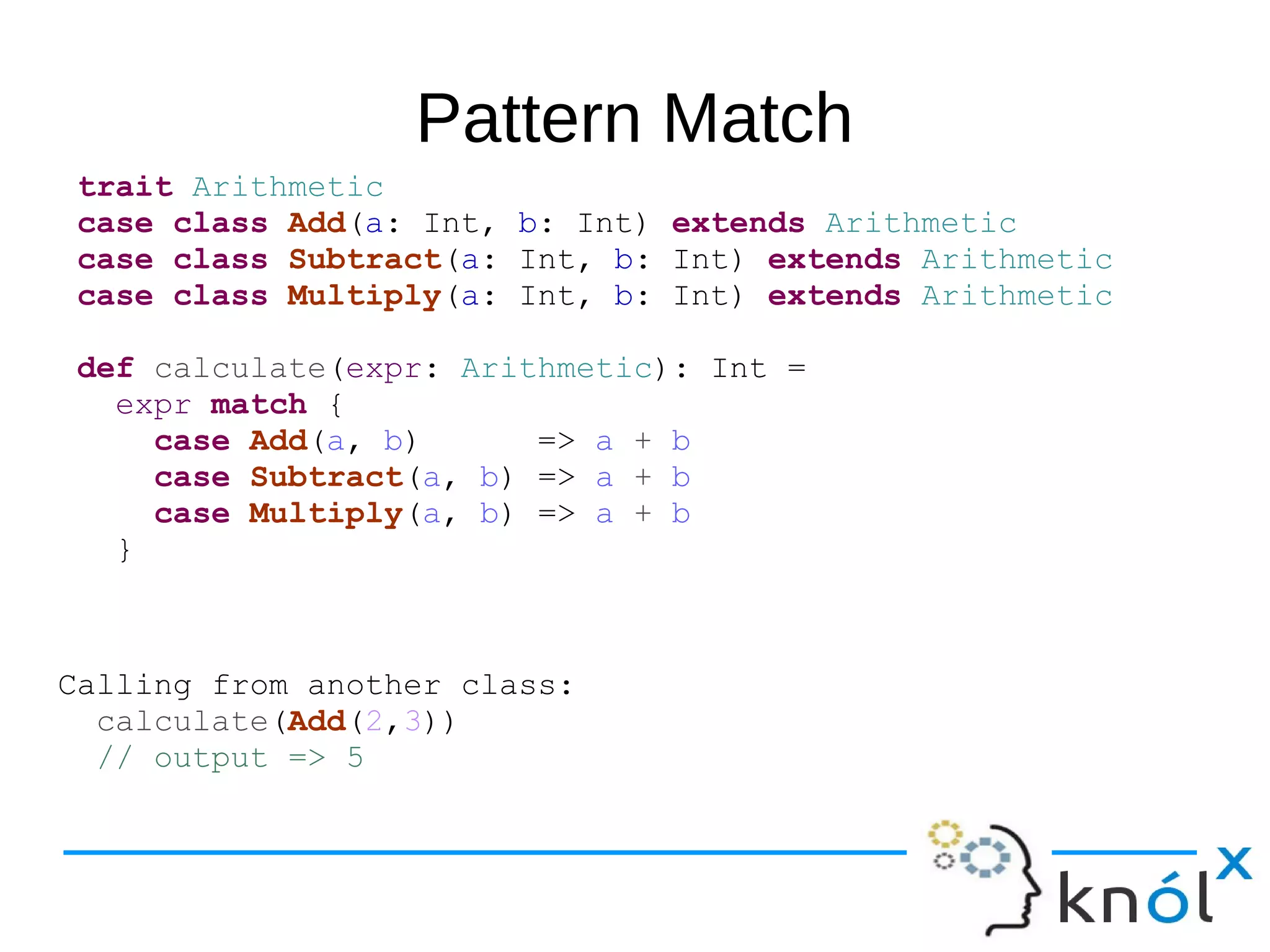
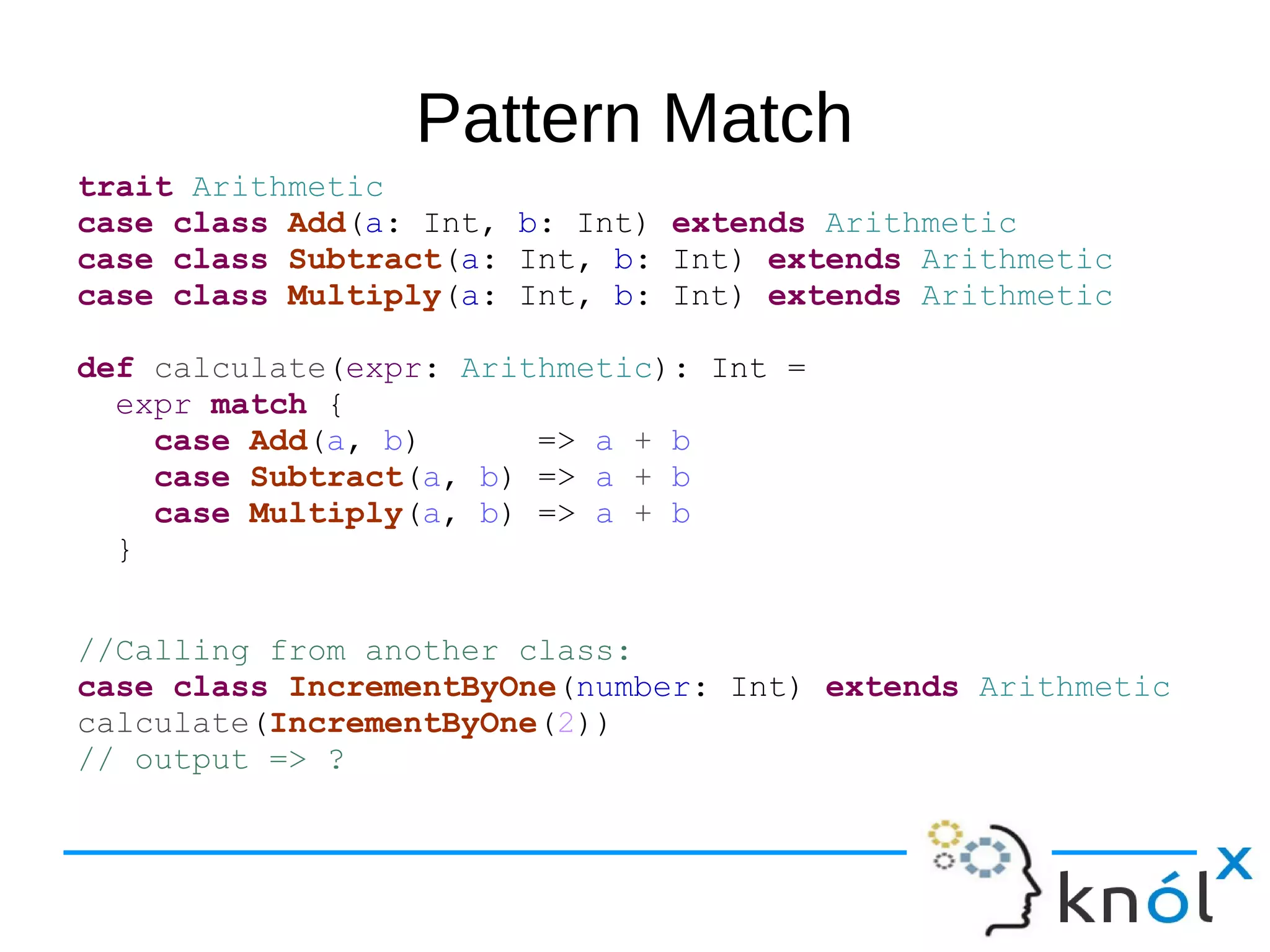

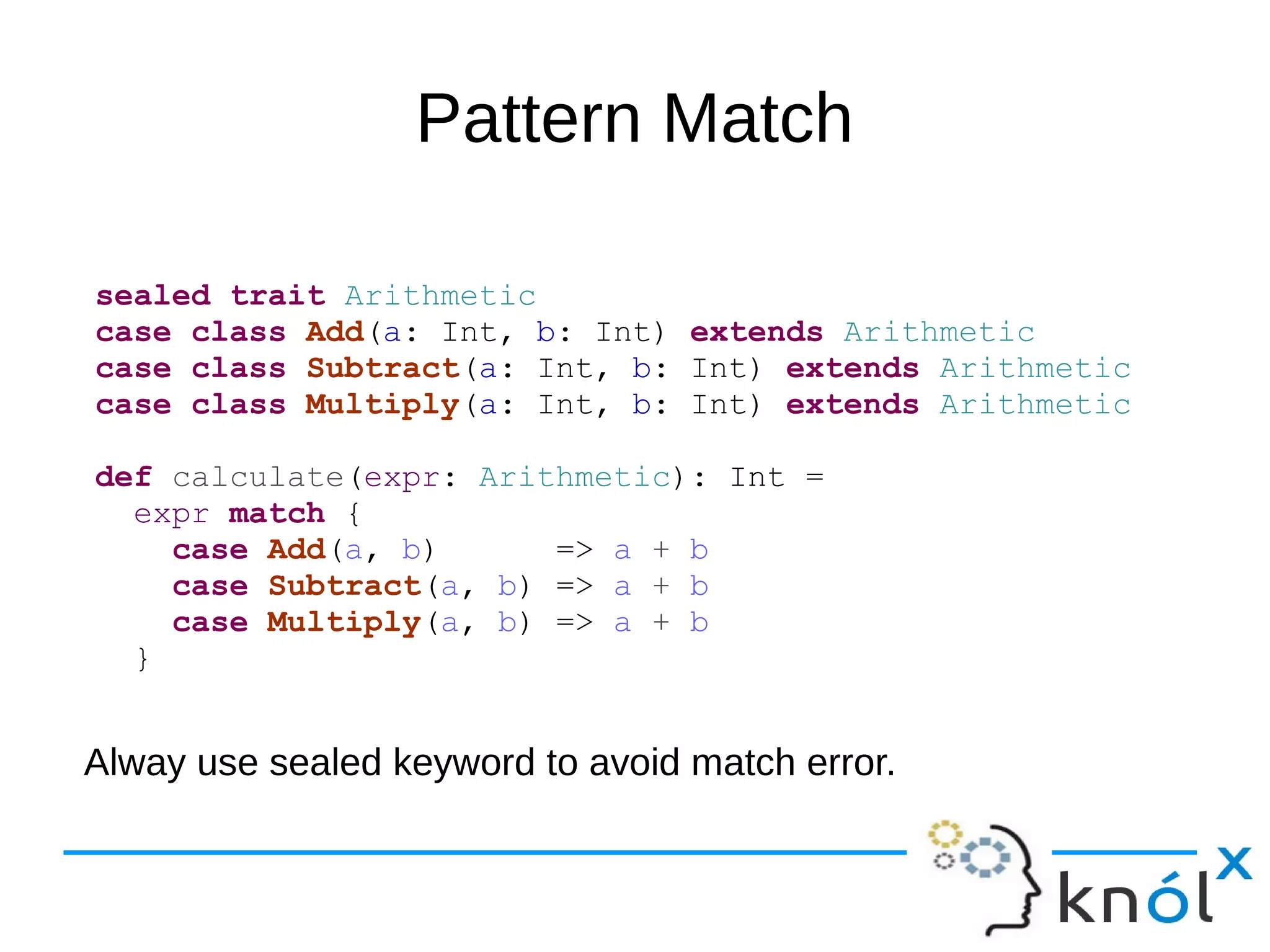
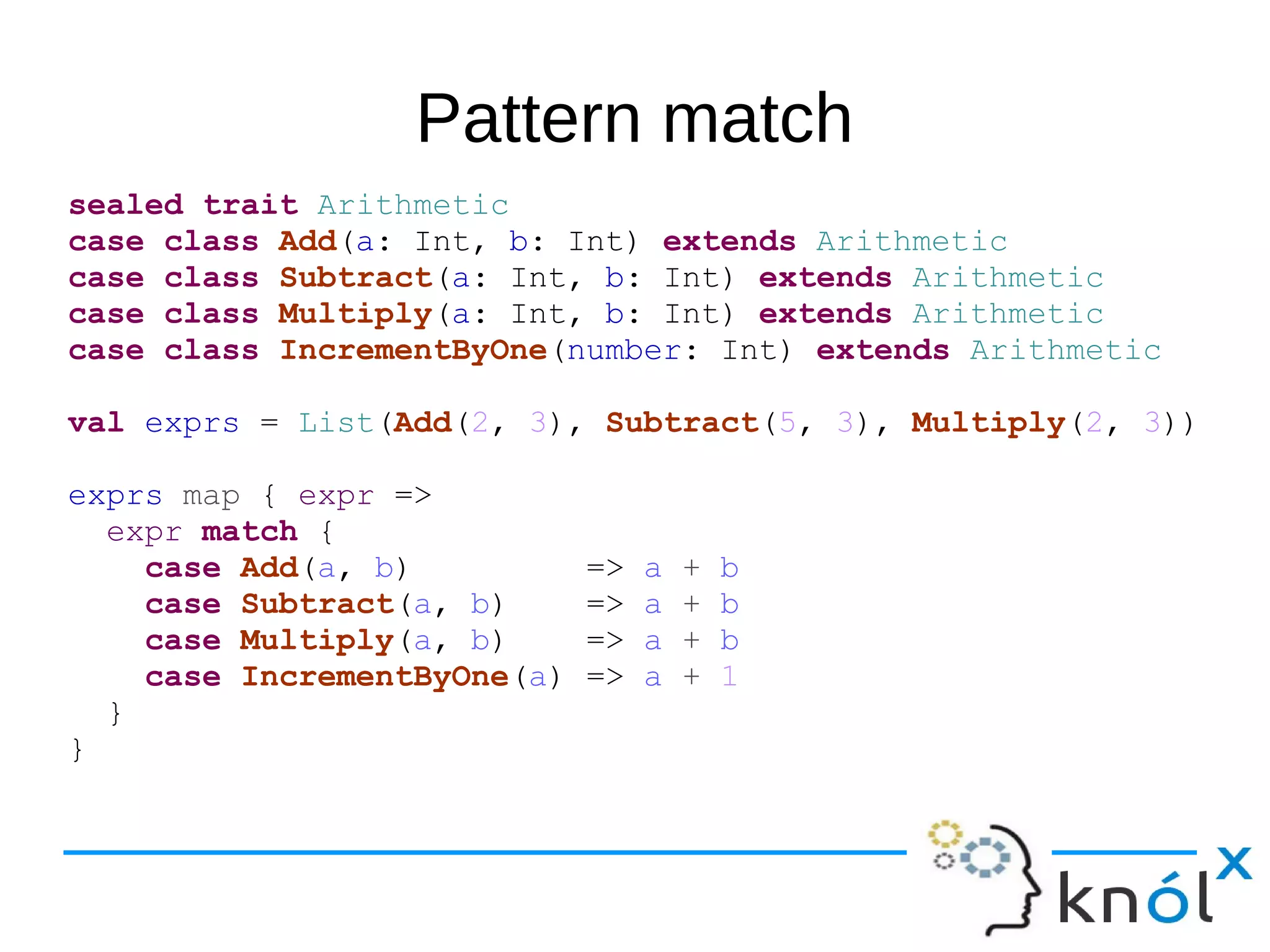
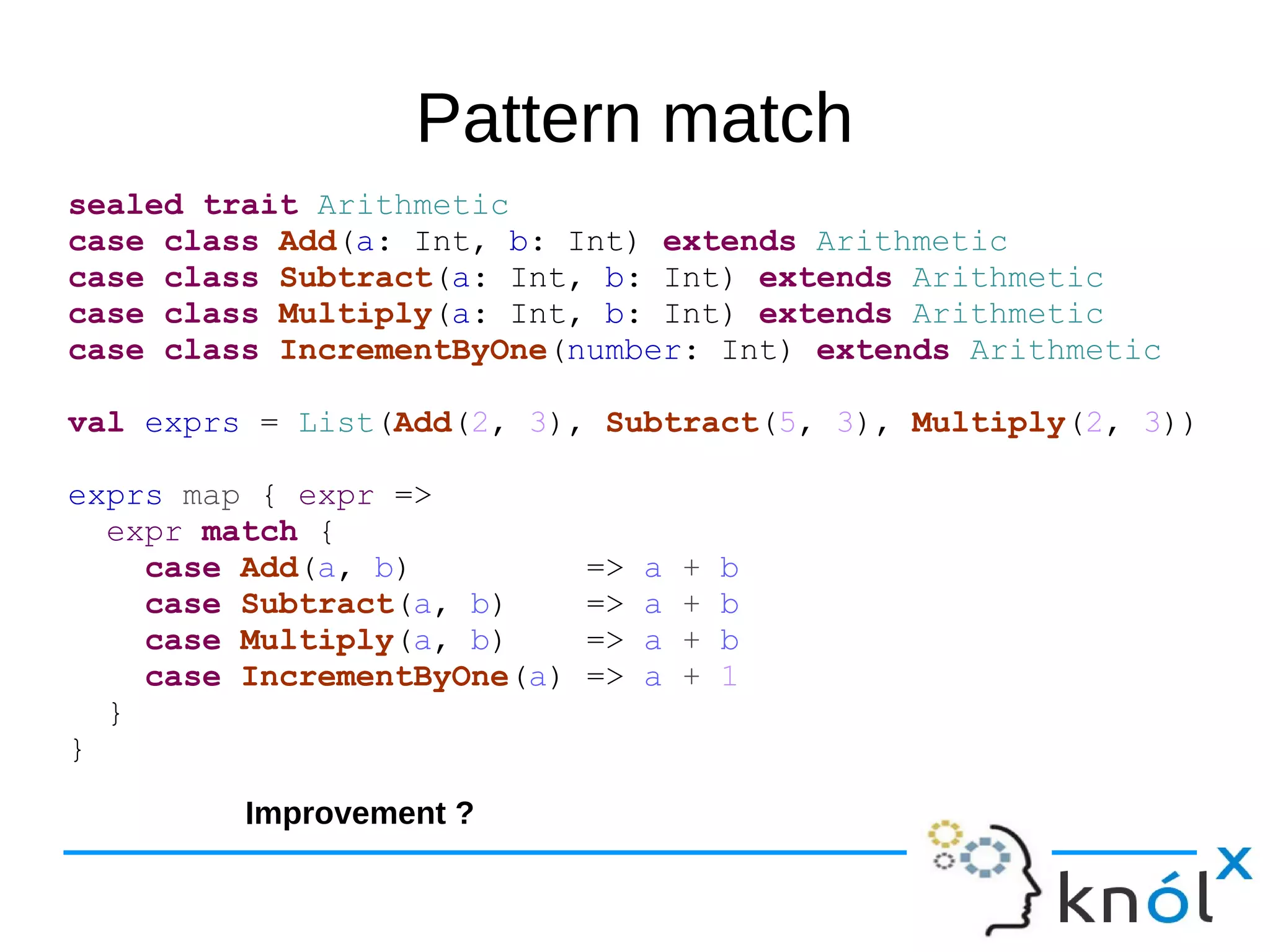
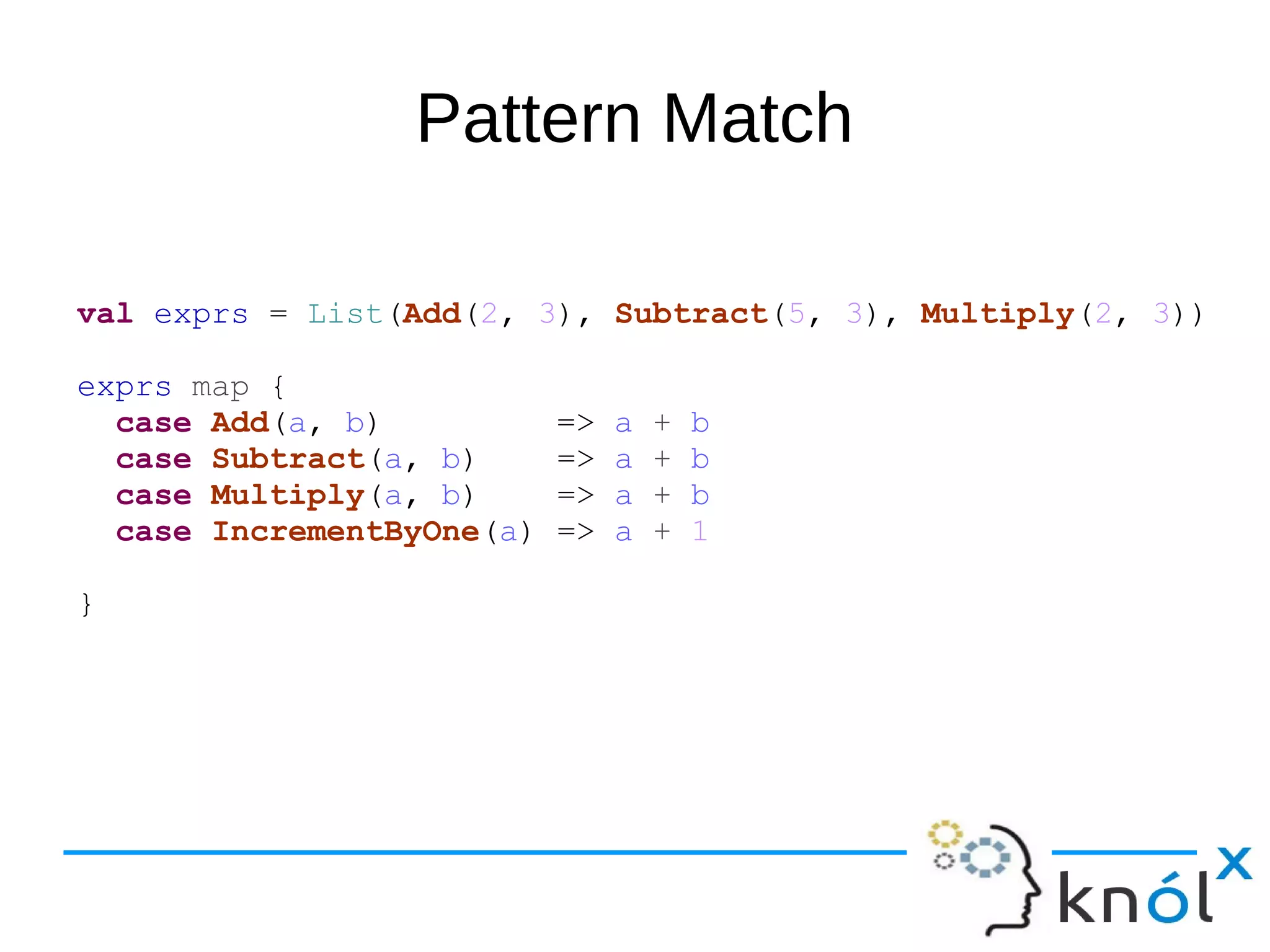
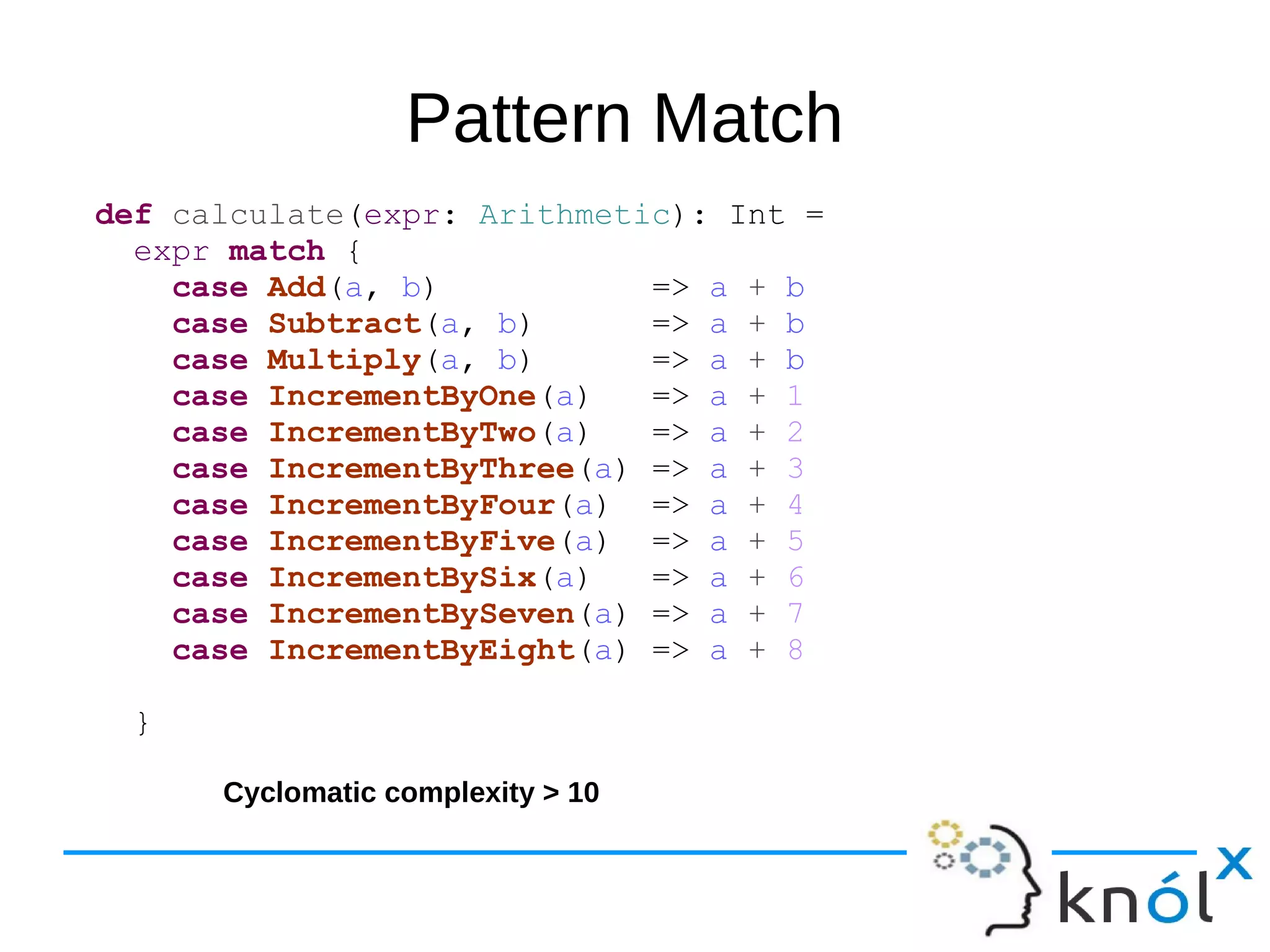
![Pattern Match
def calculate(expr: Arithmetic): Int = binaryOperation.orElse(increment)(expr)
val binaryOperation: PartialFunction[Arithmetic, Int] = {
case Add(a, b) => a + b
case Subtract(a, b) => a + b
case Multiply(a, b) => a + b
}
val increment: PartialFunction[Arithmetic, Int] = {
case IncrementByOne(a) => a + 1
case IncrementByTwo(a) => a + 2
case IncrementByThree(a) => a + 3
case IncrementByFour(a) => a + 4
case IncrementByFive(a) => a + 5
case IncrementBySix(a) => a + 6
case IncrementBySeven(a) => a + 7
case IncrementByEight(a) => a + 8
}](https://image.slidesharecdn.com/scala-effective-code-160623192533/75/Effective-way-to-code-in-Scala-12-2048.jpg)
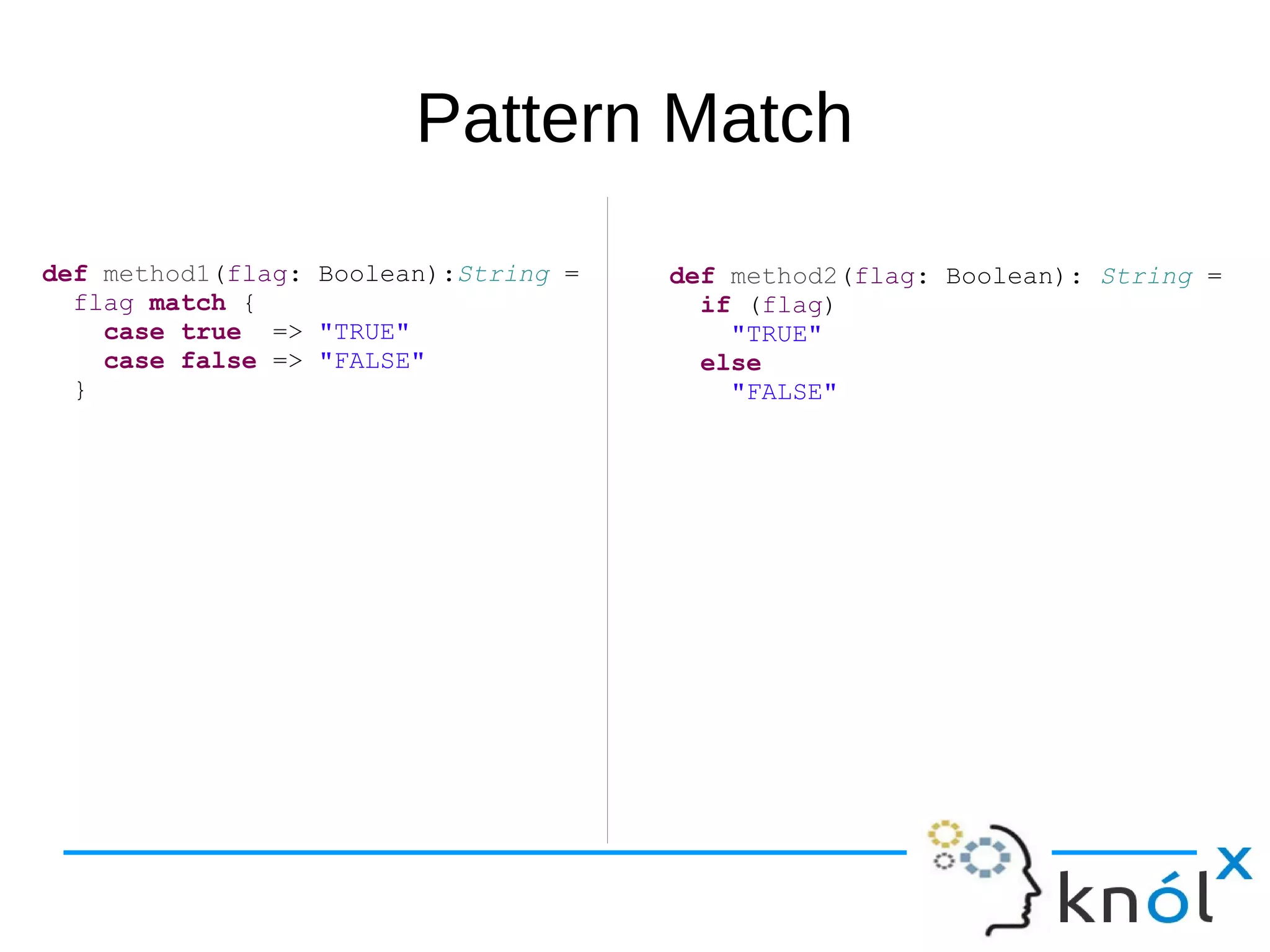
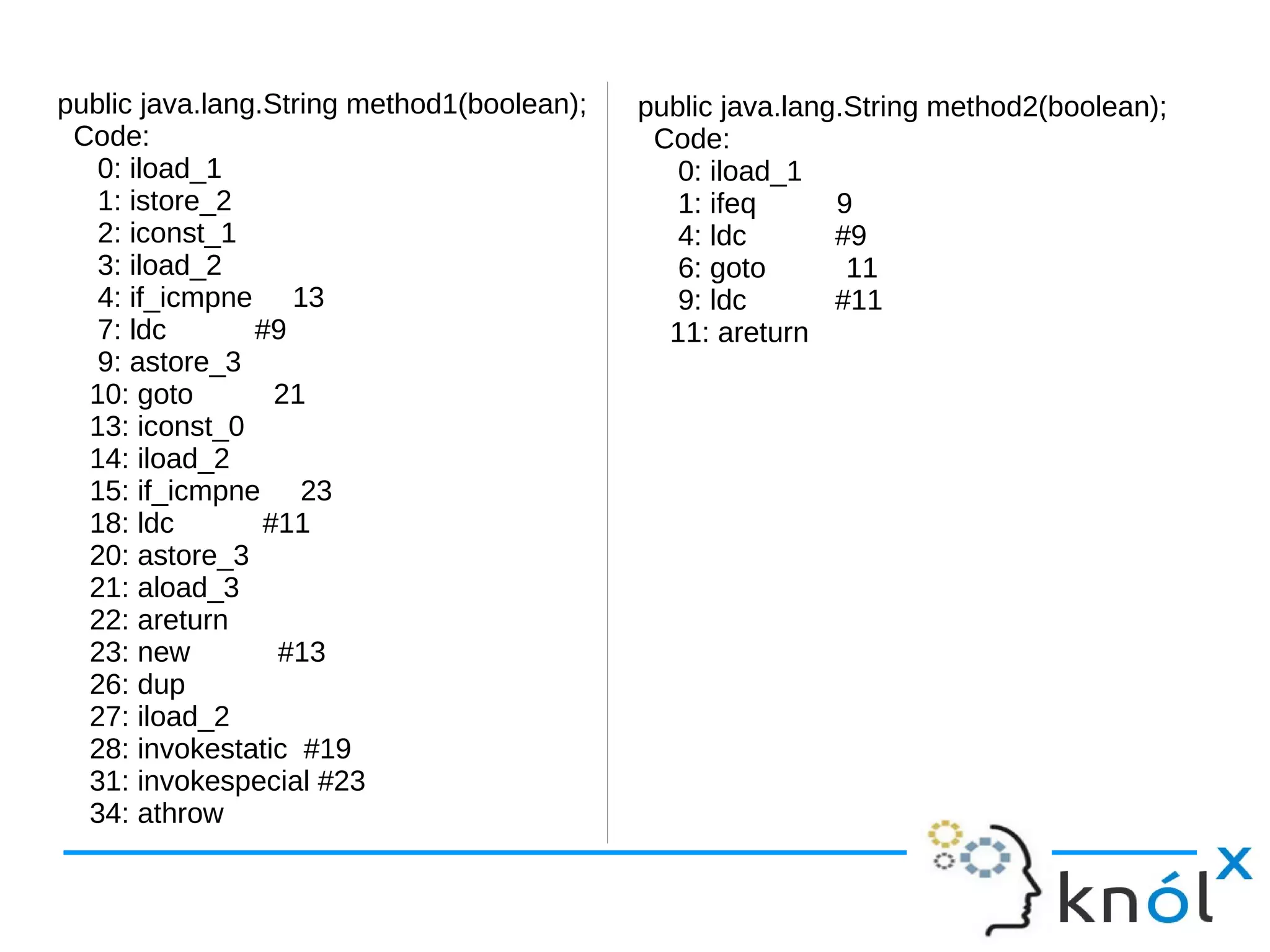
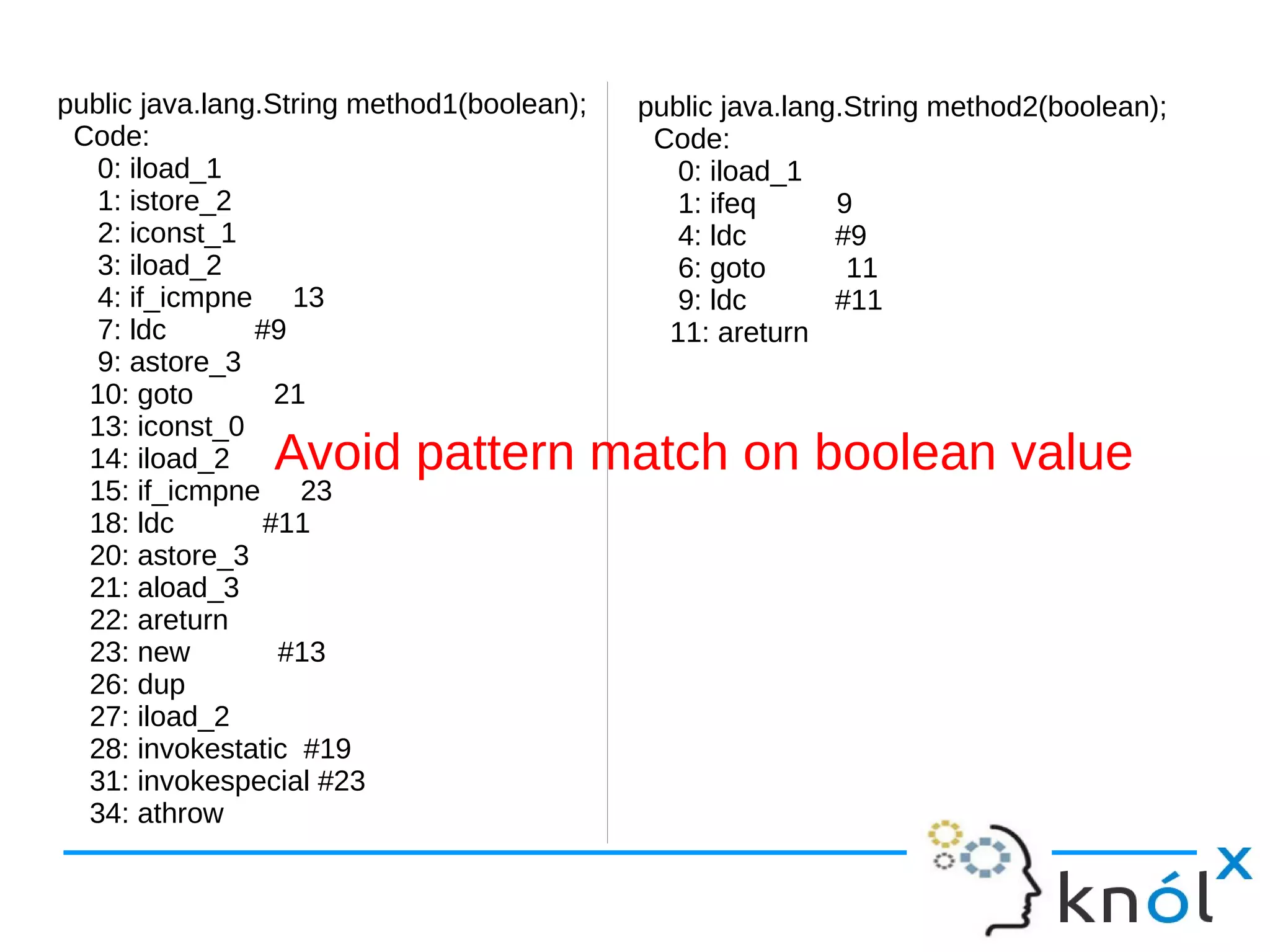
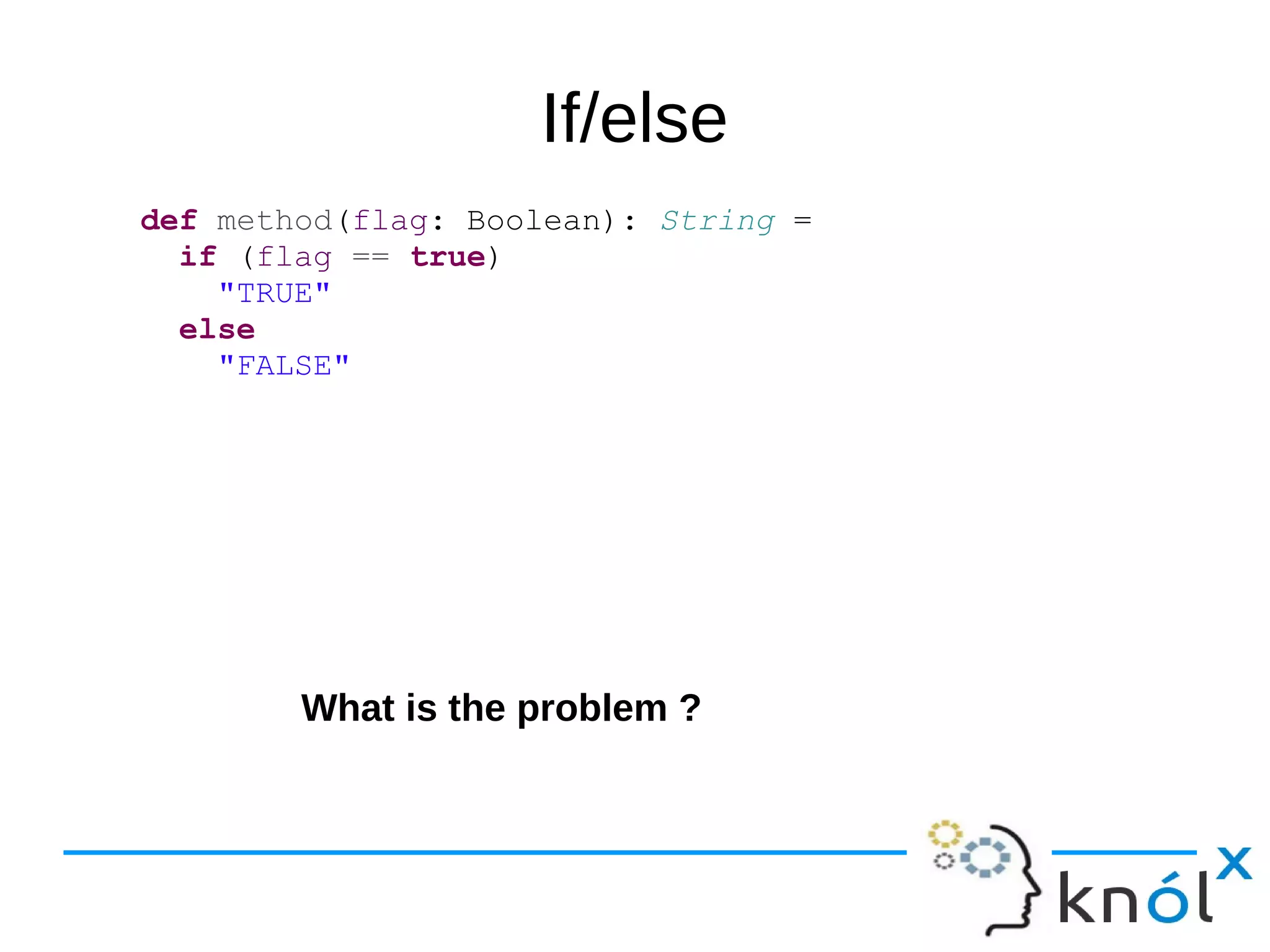
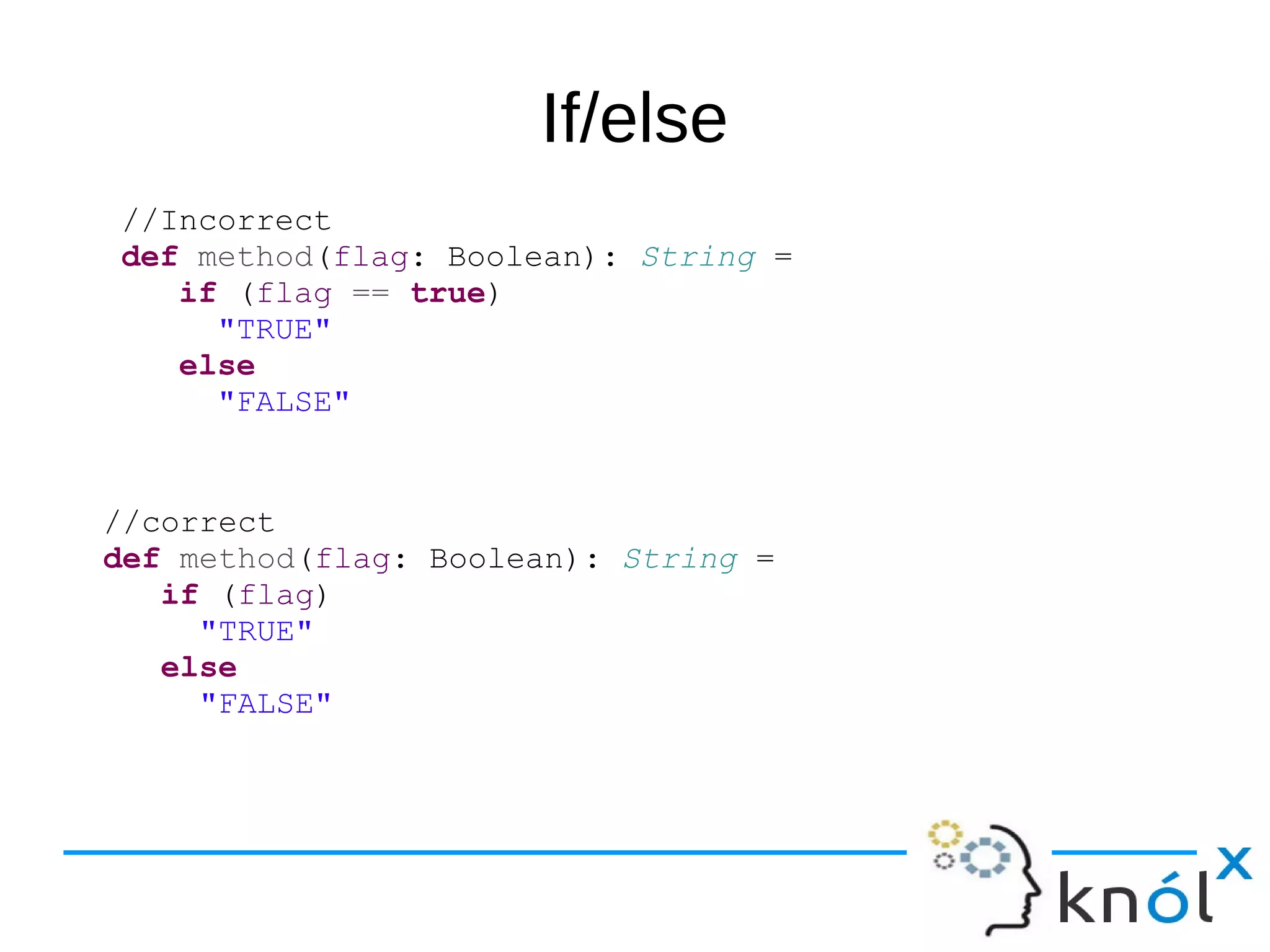
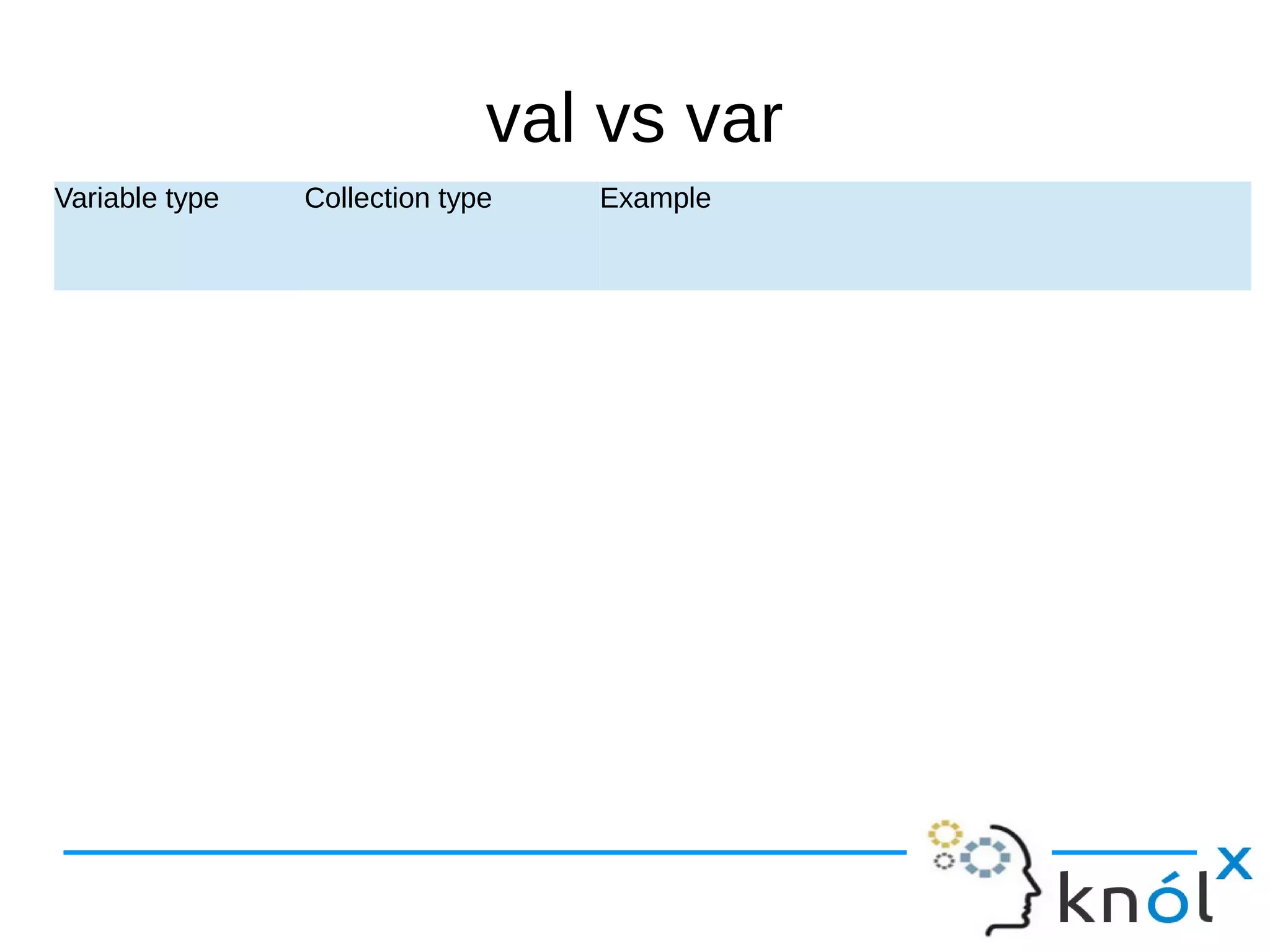

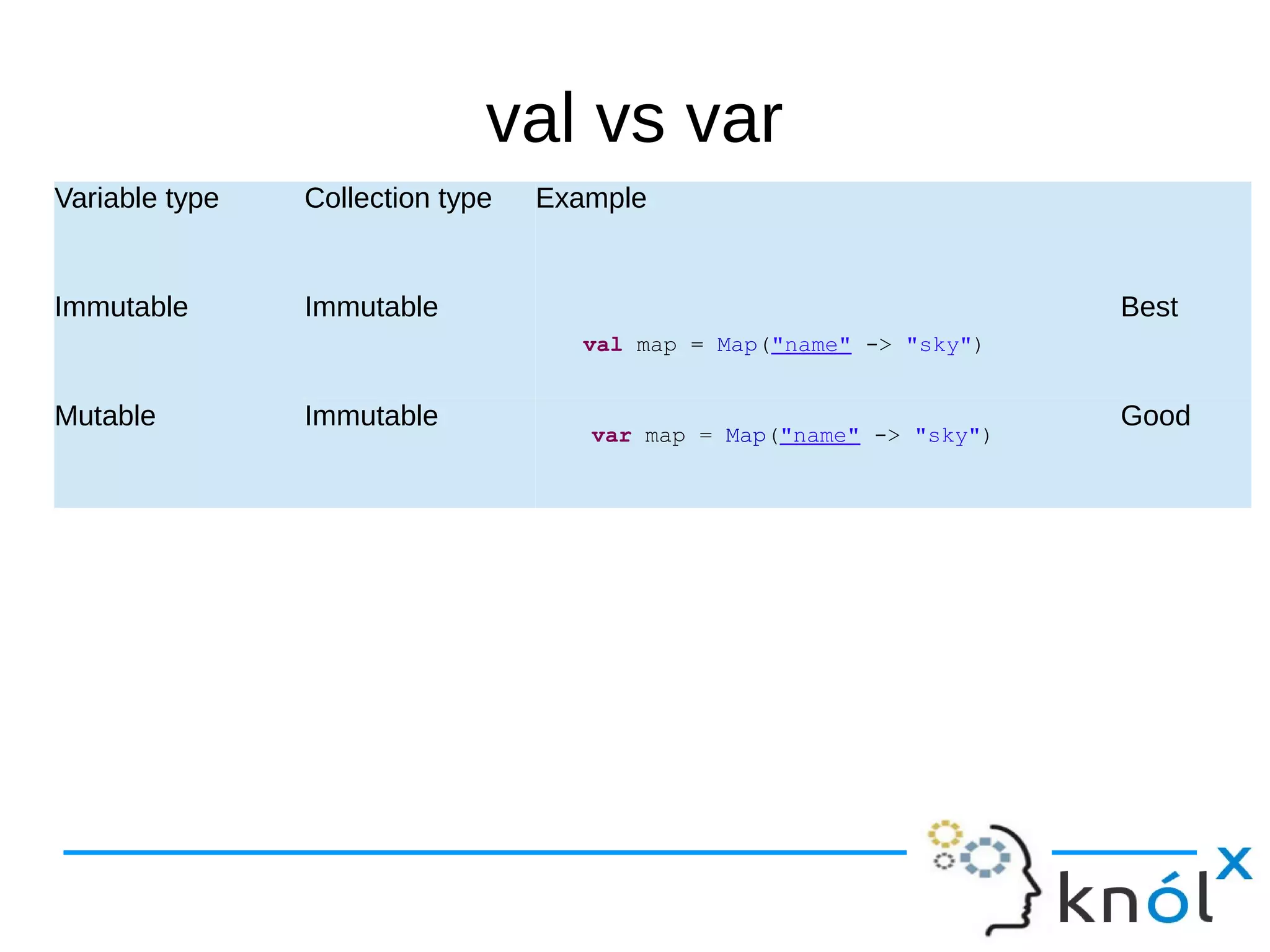
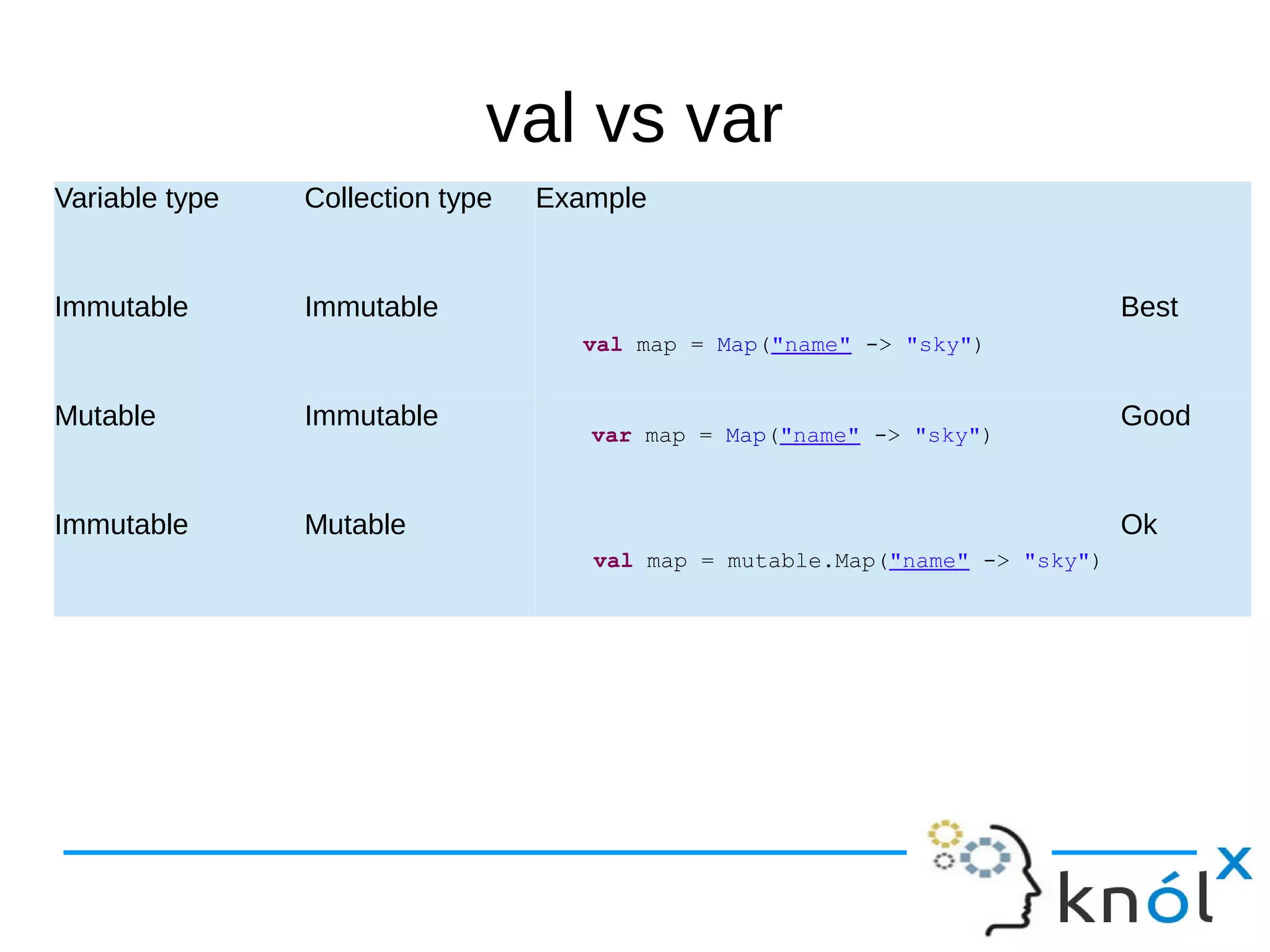
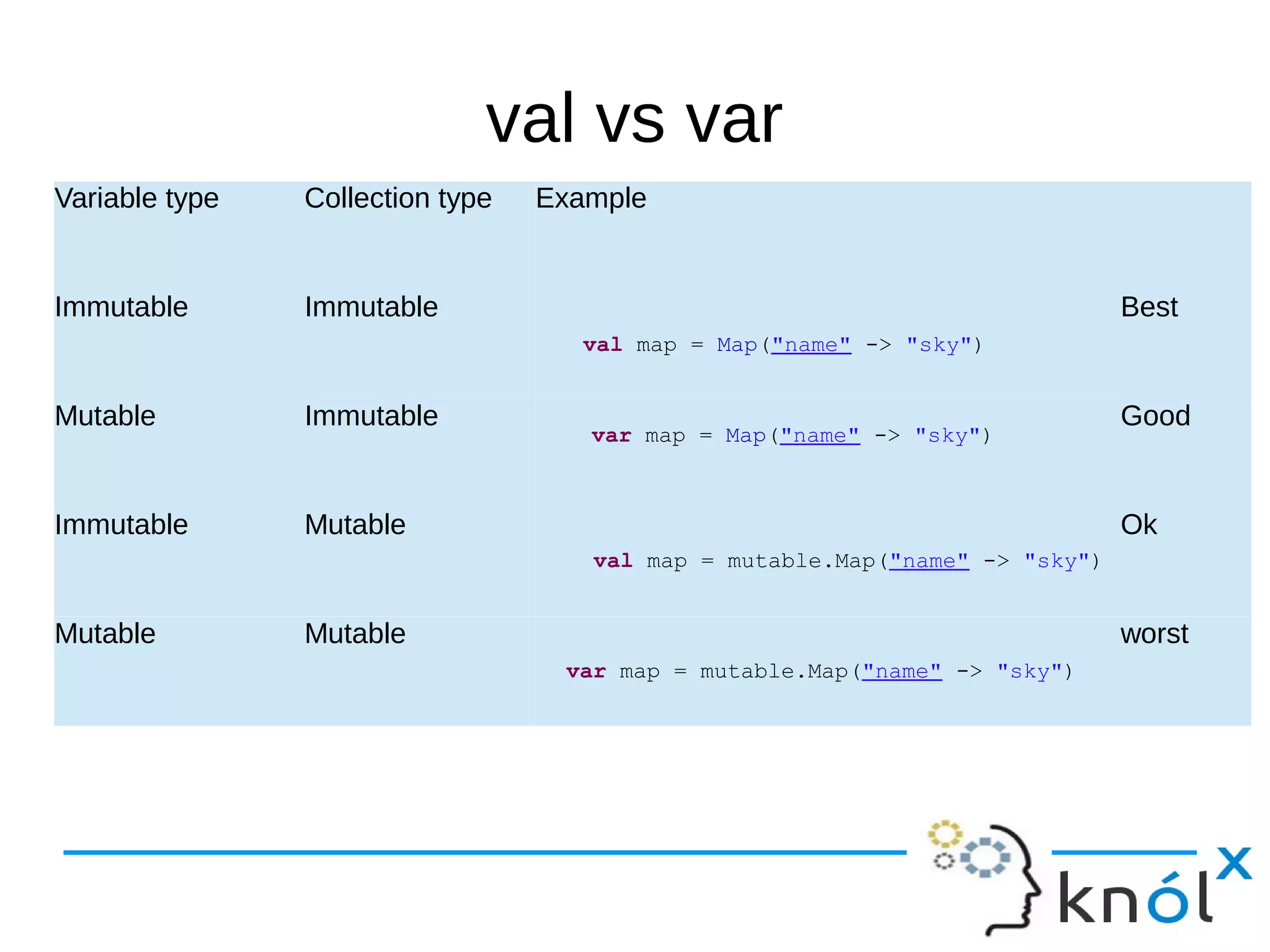
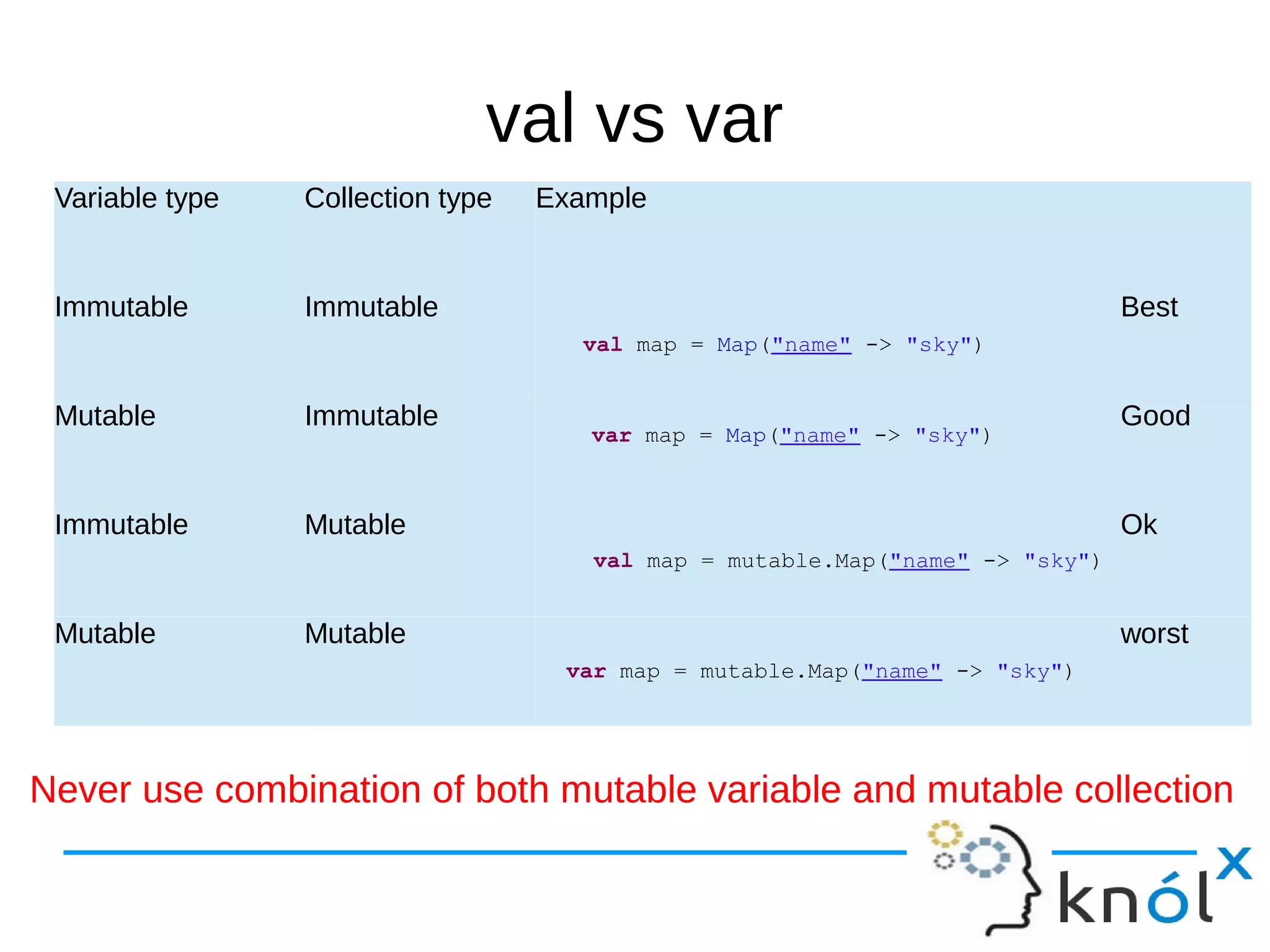
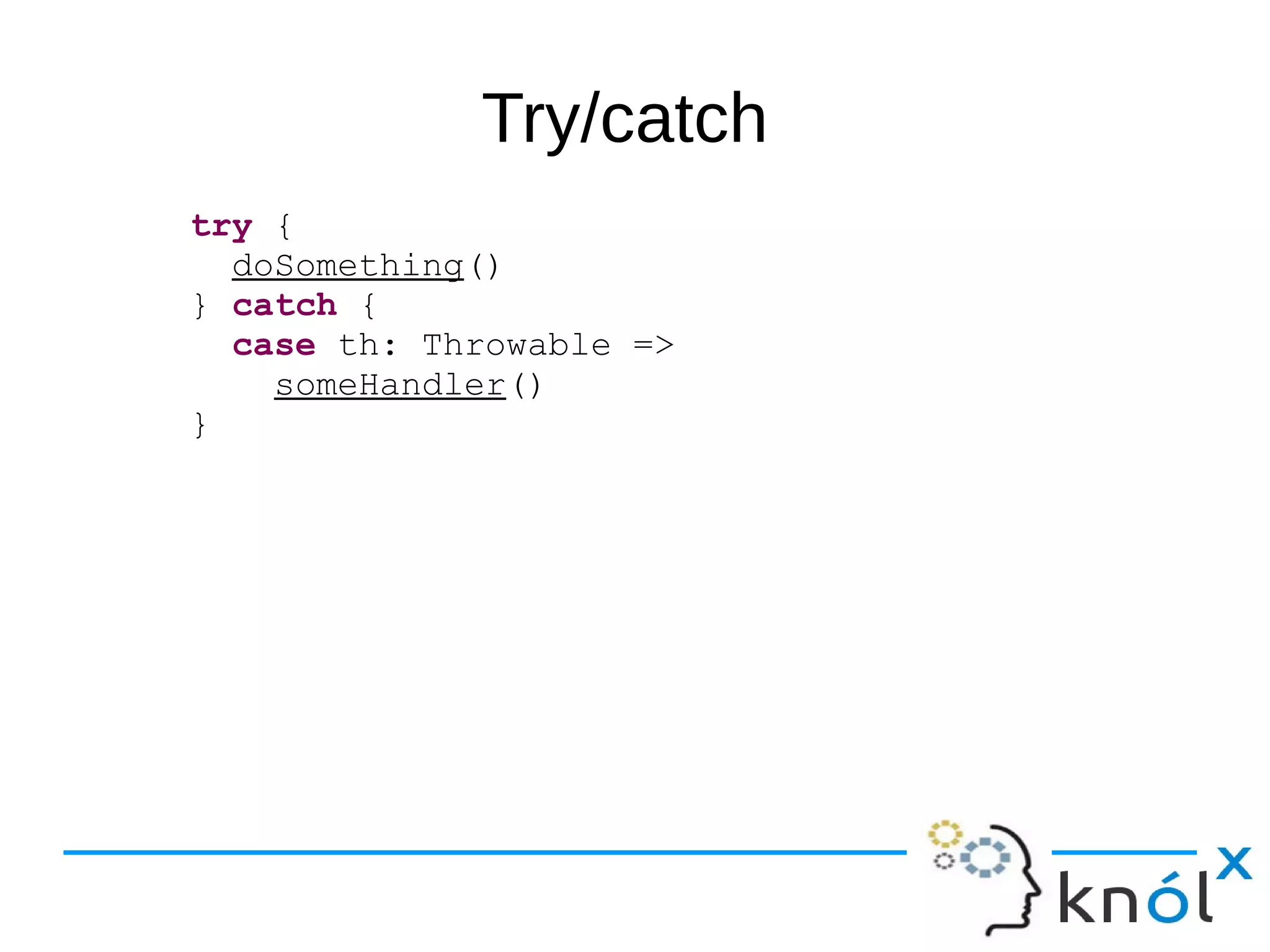
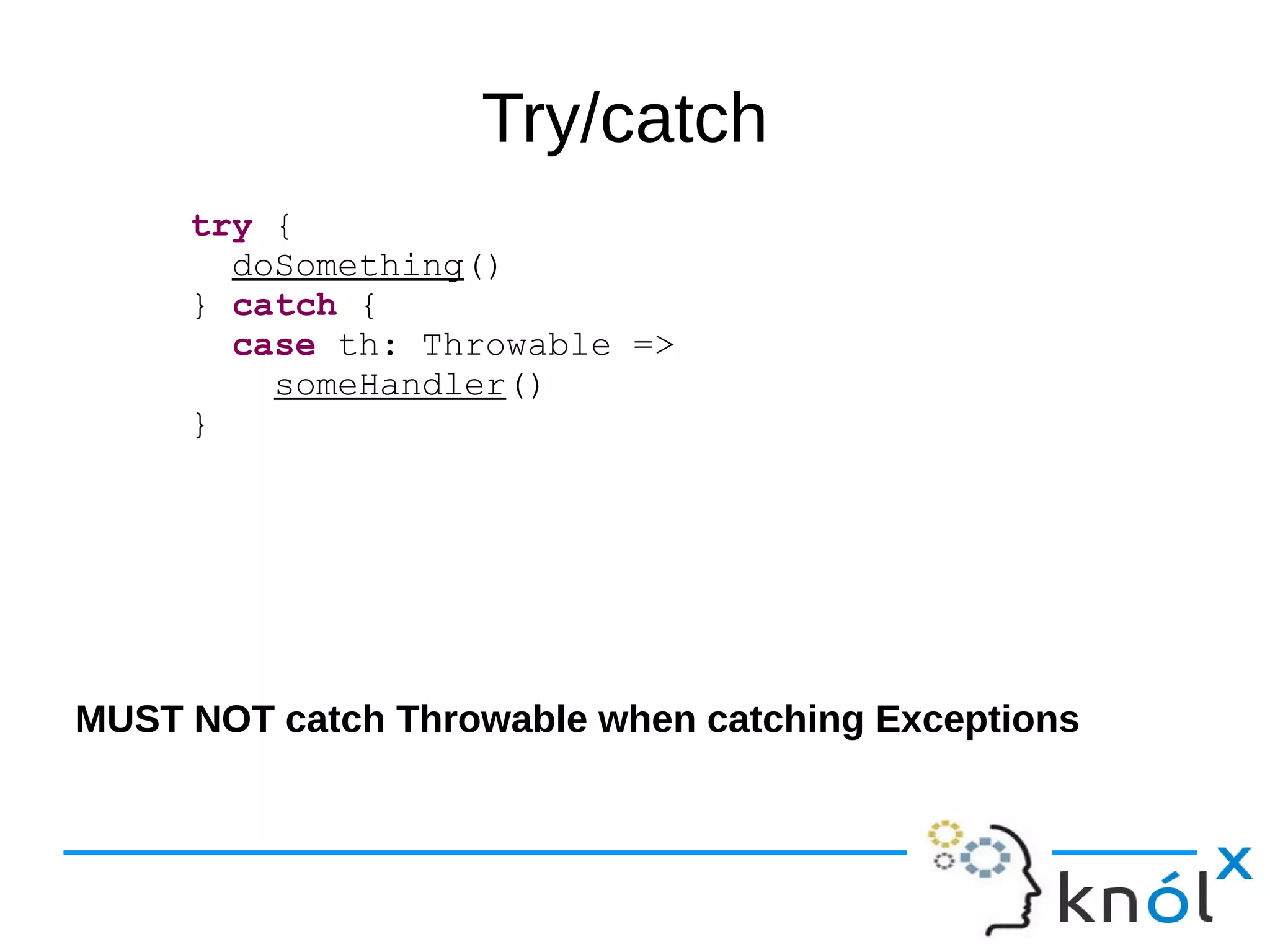
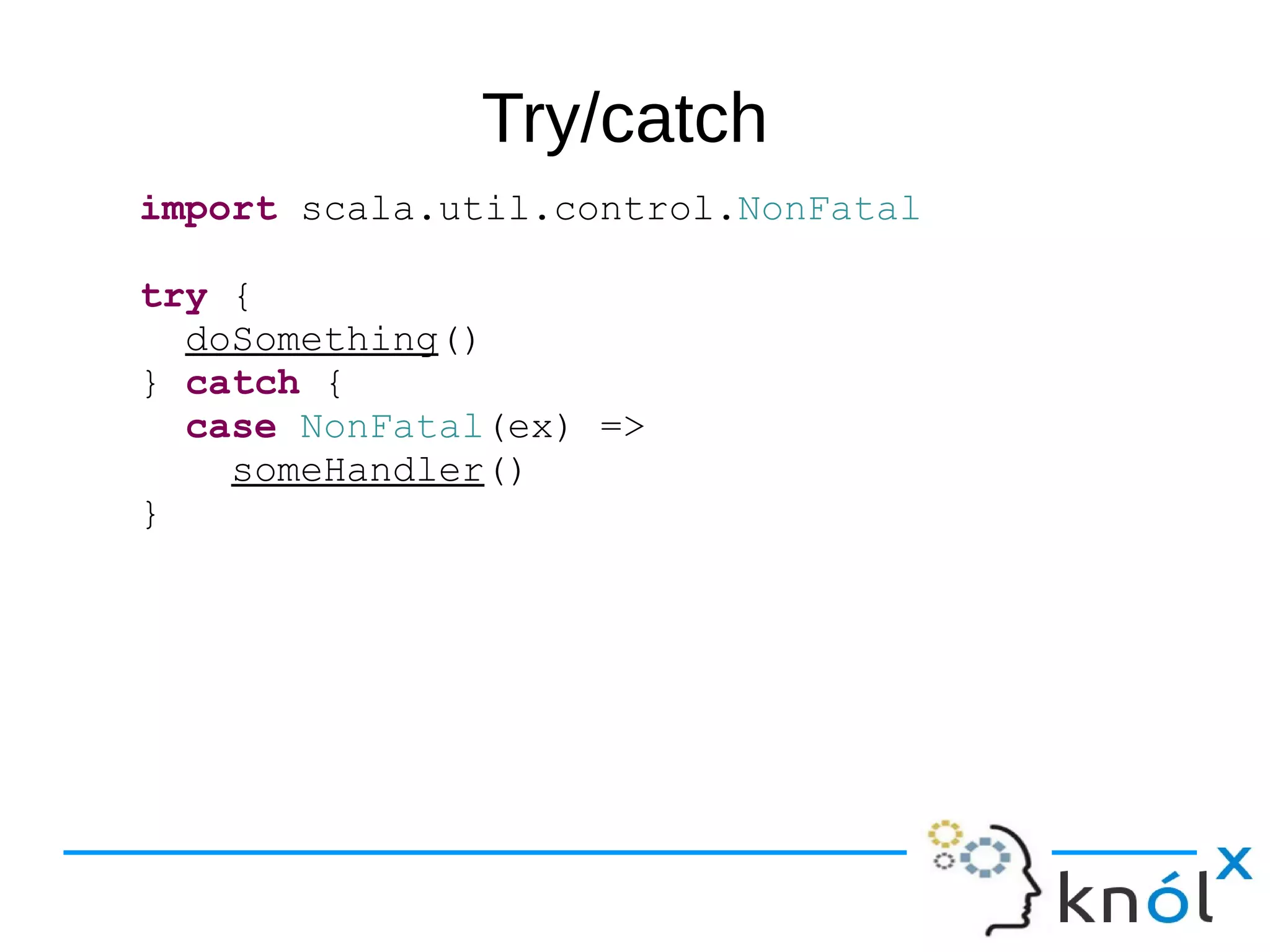
![Try/catch
object NonFatal {
/**
* Returns true if the provided `Throwable` is to be considered non-fatal, or
false if it is to be considered fatal
*/
def apply(t: Throwable): Boolean = t match {
// VirtualMachineError includes OutOfMemoryError and other fatal errors
case _: VirtualMachineError | _: ThreadDeath |
_: InterruptedException | _: LinkageError | _: ControlThrowable => false
case _ => true
}
/**
* Returns Some(t) if NonFatal(t) == true, otherwise None
*/
def unapply(t: Throwable): Option[Throwable] = if (apply(t)) Some(t) else None
}](https://image.slidesharecdn.com/scala-effective-code-160623192533/75/Effective-way-to-code-in-Scala-27-2048.jpg)
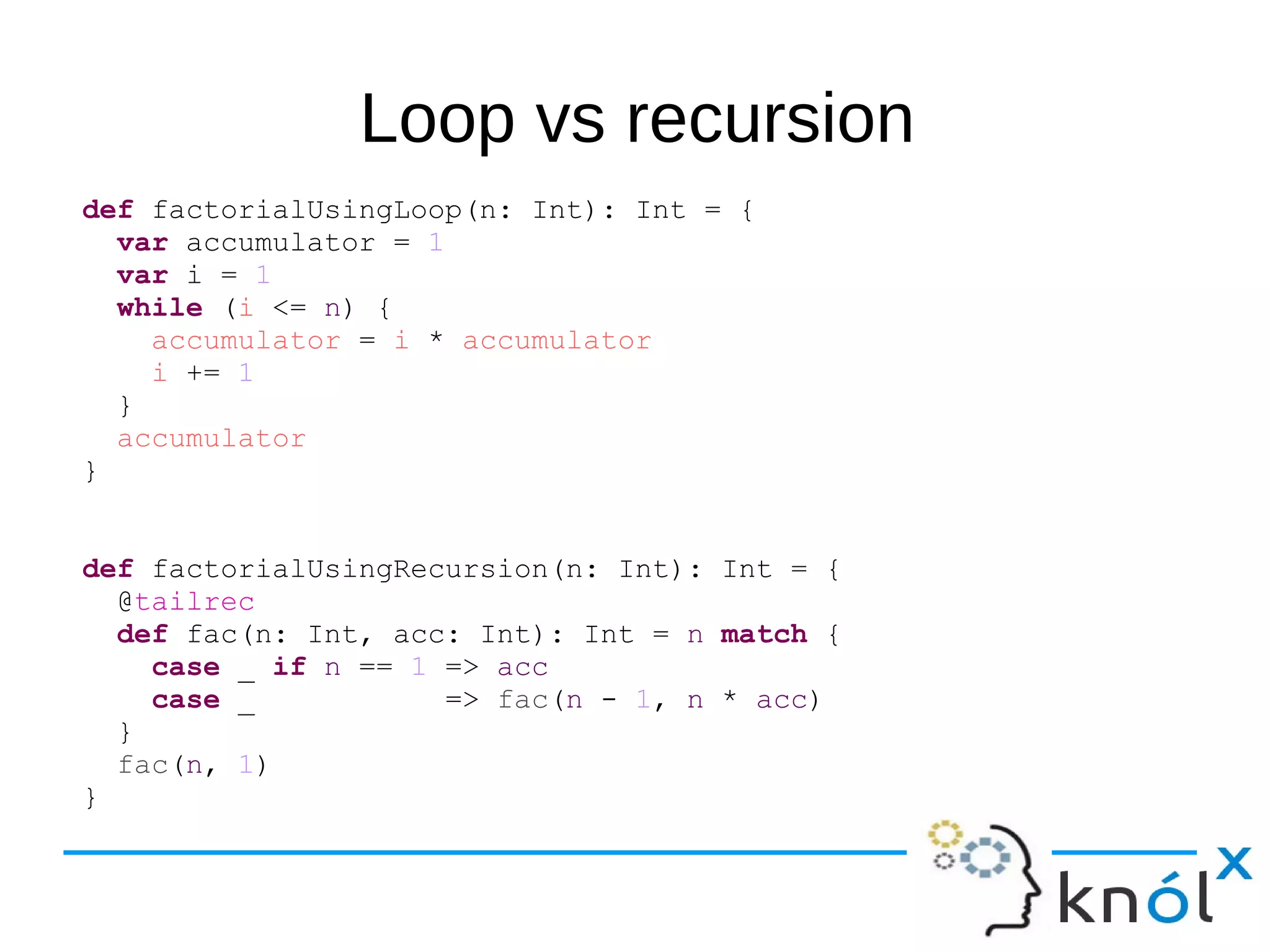
![Tuple usage
def wordCount(text: String): List[(String, Int)] =
text.split(" +").groupBy(word => word)
.map { word => (word._1, word._2.length) }
.toList
.sortBy(_._2)
.reverse](https://image.slidesharecdn.com/scala-effective-code-160623192533/75/Effective-way-to-code-in-Scala-29-2048.jpg)
![Tuple usage
def wordCount(text: String): List[(String, Int)] =
text.split(" +").groupBy(word => word)
.map { word => (word._1, word._2.length) }
.toList
.sortBy(_._2)
.reverse
def wordCount(text: String): List[(String, Int)] =
text.split(" +").groupBy(identity)
.map { case (word, frequency) => (word, frequency.length) }
.toList
.sortBy { case (_, count) => count }
.reverse
// More Readable](https://image.slidesharecdn.com/scala-effective-code-160623192533/75/Effective-way-to-code-in-Scala-30-2048.jpg)
![Tuple usage
def wordCount(text: String): List[(String, Int)] =
text.split(" +").groupBy(word => word)
.map { word => (word._1, word._2.length) }
.toList
.sortBy(_._2)
.reverse
def wordCount(text: String): List[(String, Int)] =
text.split(" +").groupBy(identity)
.map { case (word, frequency) => (word, frequency.length) }
.toList
.sortBy { case (_, count) => count }
.reverse
// More Readable
Avoid _1 and _2 method for accessing tuple value](https://image.slidesharecdn.com/scala-effective-code-160623192533/75/Effective-way-to-code-in-Scala-31-2048.jpg)
![getOrElse vs fold
val optionalInt:Option[Int]=Some(1)
val intValue= optionalInt.getOrElse("0")](https://image.slidesharecdn.com/scala-effective-code-160623192533/75/Effective-way-to-code-in-Scala-32-2048.jpg)
![getOrElse vs fold
val optionalInt:Option[Int]=Some(1)
val intValue= optionalInt.getOrElse("0")
String value](https://image.slidesharecdn.com/scala-effective-code-160623192533/75/Effective-way-to-code-in-Scala-33-2048.jpg)
![getOrElse vs fold
val optionalInt:Option[Int]=Some(1)
val intValue= optionalInt.getOrElse("0")
String value
Type of intValue become Any
val intValue= optionalInt.fold("0")(v =>v)](https://image.slidesharecdn.com/scala-effective-code-160623192533/75/Effective-way-to-code-in-Scala-34-2048.jpg)
![getOrElse vs fold
val optionalInt:Option[Int]=Some(1)
val intValue= optionalInt.getOrElse("0")
String value
Type of intValue become Any
val intValue= optionalInt.fold("0")(v =>v)
Compilation Error](https://image.slidesharecdn.com/scala-effective-code-160623192533/75/Effective-way-to-code-in-Scala-35-2048.jpg)
![getOrElse vs fold
val optionalInt:Option[Int]=Some(1)
val intValue= optionalInt.getOrElse("0")
String value
Type of intValue become Any
val intValue= optionalInt.fold(0)(v =>v)
getOrElse is not typesafe so use fold instead of getOrElse](https://image.slidesharecdn.com/scala-effective-code-160623192533/75/Effective-way-to-code-in-Scala-36-2048.jpg)
![head and get
val list =List[Int]().head](https://image.slidesharecdn.com/scala-effective-code-160623192533/75/Effective-way-to-code-in-Scala-37-2048.jpg)
![head and get
val list =List[Int]().head
Exception: head of empty list
val list =List[Int]().headOption
val optionalInt: Option[Int] = None
val intValue = optionalInt.get](https://image.slidesharecdn.com/scala-effective-code-160623192533/75/Effective-way-to-code-in-Scala-38-2048.jpg)
![head and get
val list =List[Int]().head
Exception: head of empty list
val list =List[Int]().headOption
val optionalInt: Option[Int] = None
val intValue = optionalInt.get
scala.None$.get
val intValue = optionalInt.fold(0)(v=>v)](https://image.slidesharecdn.com/scala-effective-code-160623192533/75/Effective-way-to-code-in-Scala-39-2048.jpg)
![head and get
val list =List[Int]().head
Exception: head of empty list
val list =List[Int]().headOption
val optionalInt: Option[Int] = None
val intValue = optionalInt.get
scala.None$.get
val intValue = optionalInt.fold(0)(v=>v)
Alway Avoid head and get method](https://image.slidesharecdn.com/scala-effective-code-160623192533/75/Effective-way-to-code-in-Scala-40-2048.jpg)
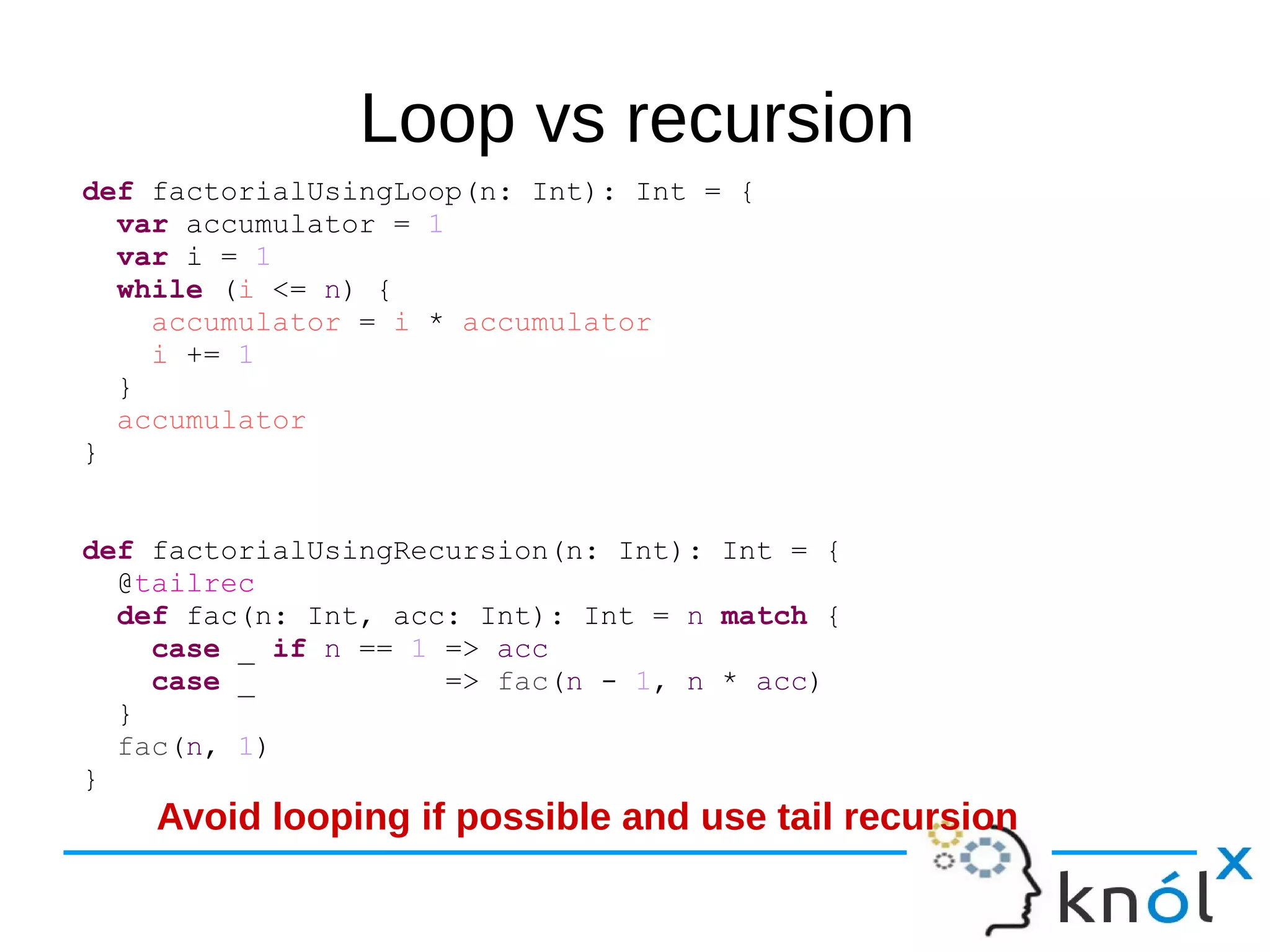
![Future Composition
def composingFuture(): Future[Int] = {
val firstFuture: Future[Int] = method1()
val secondFuture: Future[Int] = firstFuture.flatMap { v => method2(v) }
val thirdFuture: Future[Int] = secondFuture.flatMap { v => method3(v) }
val fourthFuture: Future[Int] = method4() // no composition
val result: Future[Int] = thirdFuture.flatMap { v => method5(v) }
result
}
def method1(): Future[Int] = ???
def method2(value: Int): Future[Int] = ???
def method3(value: Int): Future[Int] = ???
def method4(): Future[Int] = ???
def method5(value: Int): Future[Int] = ???](https://image.slidesharecdn.com/scala-effective-code-160623192533/75/Effective-way-to-code-in-Scala-42-2048.jpg)
![Future Composition
def composingFuture(): Future[Int] = {
val firstFuture: Future[Int] = method1()
val secondFuture: Future[Int] = firstFuture.flatMap { v => method2(v) }
val thirdFuture: Future[Int] = secondFuture.flatMap { v => method3(v) }
val fourthFuture: Future[Int] = method4() // no composition
val result: Future[Int] = thirdFuture.flatMap { v => method5(v) }
result
}
def method1(): Future[Int] = ???
def method2(value: Int): Future[Int] = ???
def method3(value: Int): Future[Int] = ???
def method4(): Future[Int] = ???
def method5(value: Int): Future[Int] = ???
what is the problem ?](https://image.slidesharecdn.com/scala-effective-code-160623192533/75/Effective-way-to-code-in-Scala-43-2048.jpg)
![Future Composition
def composingFuture(): Future[Int] = {
val firstFuture: Future[Int] = method1()
val secondFuture: Future[Int] = firstFuture.flatMap { v => method2(v) }
val thirdFuture: Future[Int] = secondFuture.flatMap { v => method3(v) }
val fourthFuture: Future[Int] = method4()
val result: Future[Int] = thirdFuture.flatMap { v => method5(v) }
fourthFuture.flatMap{ _=> result}// composing fourth future value
}
def method1(): Future[Int] = ???
def method2(value: Int): Future[Int] = ???
def method3(value: Int): Future[Int] = ???
def method4(): Future[Int] = ???
def method5(value: Int): Future[Int] = ???](https://image.slidesharecdn.com/scala-effective-code-160623192533/75/Effective-way-to-code-in-Scala-44-2048.jpg)
![Fixed Value for Future
import scala.concurrent.ExecutionContext.Implicits.global
def calculate(value: Option[Int]): Future[Int] =
value match {
case Some(v) => method(v)
case None => Future(0)
}
def method(value: Int): Future[Int] = ???](https://image.slidesharecdn.com/scala-effective-code-160623192533/75/Effective-way-to-code-in-Scala-45-2048.jpg)
![Fixed Value for Future
def calculate(value: Option[Int]): Future[Int] =
value match {
case Some(v) => method(v)
case None => Future.successful(0)
}
def method(value: Int): Future[Int] = ???
Alway use Future.successful for fixed value and Future.failed for exception](https://image.slidesharecdn.com/scala-effective-code-160623192533/75/Effective-way-to-code-in-Scala-46-2048.jpg)
